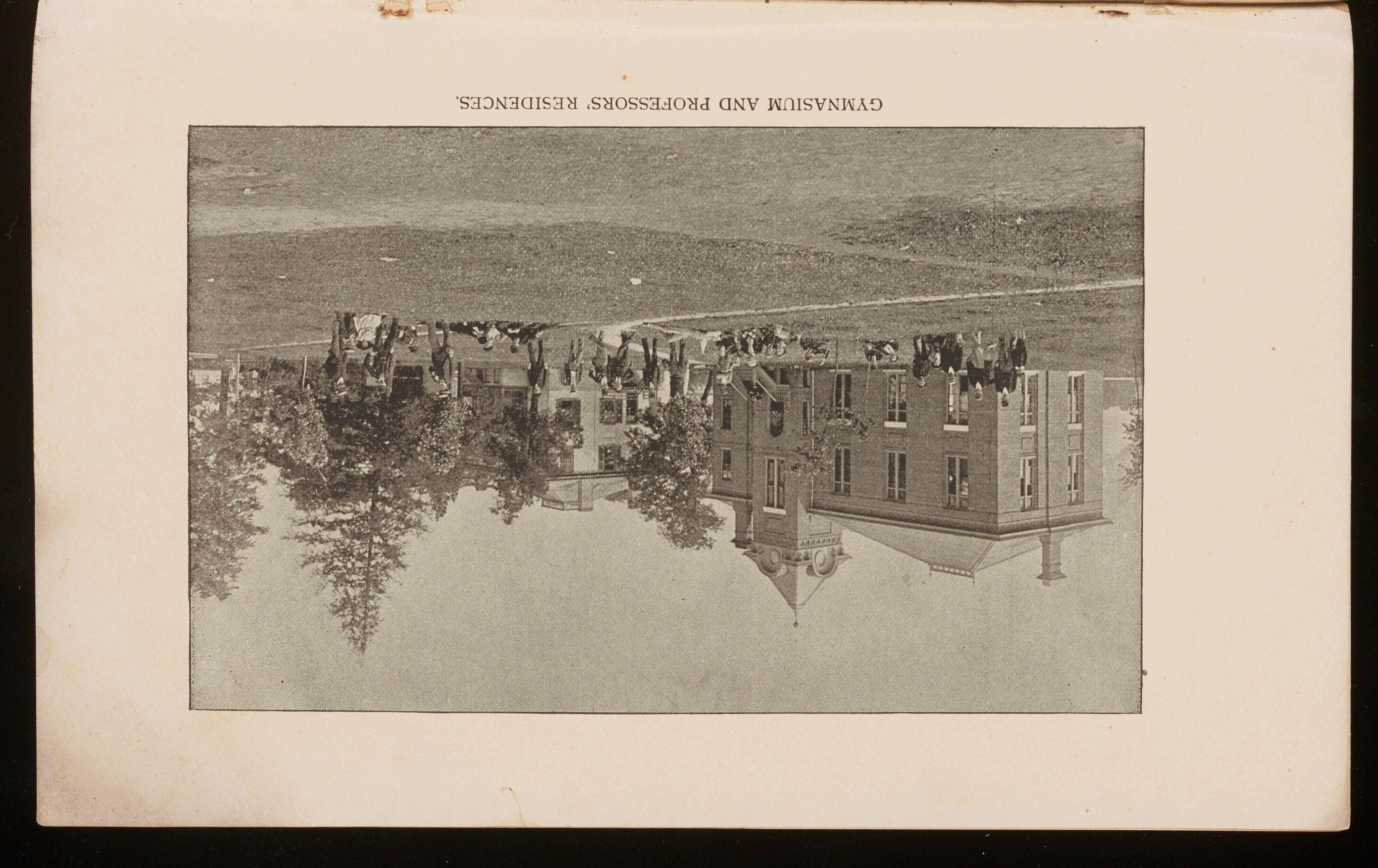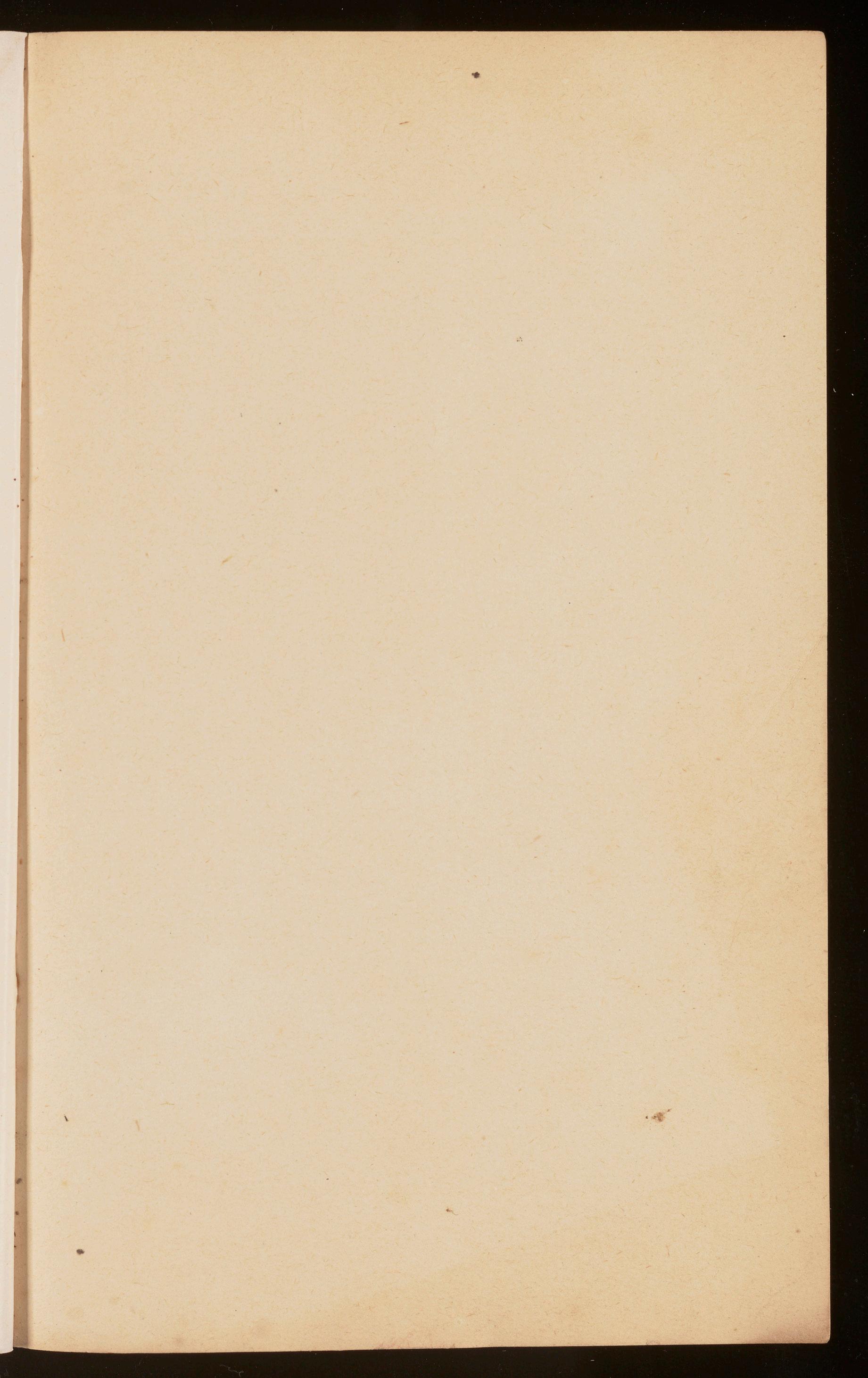
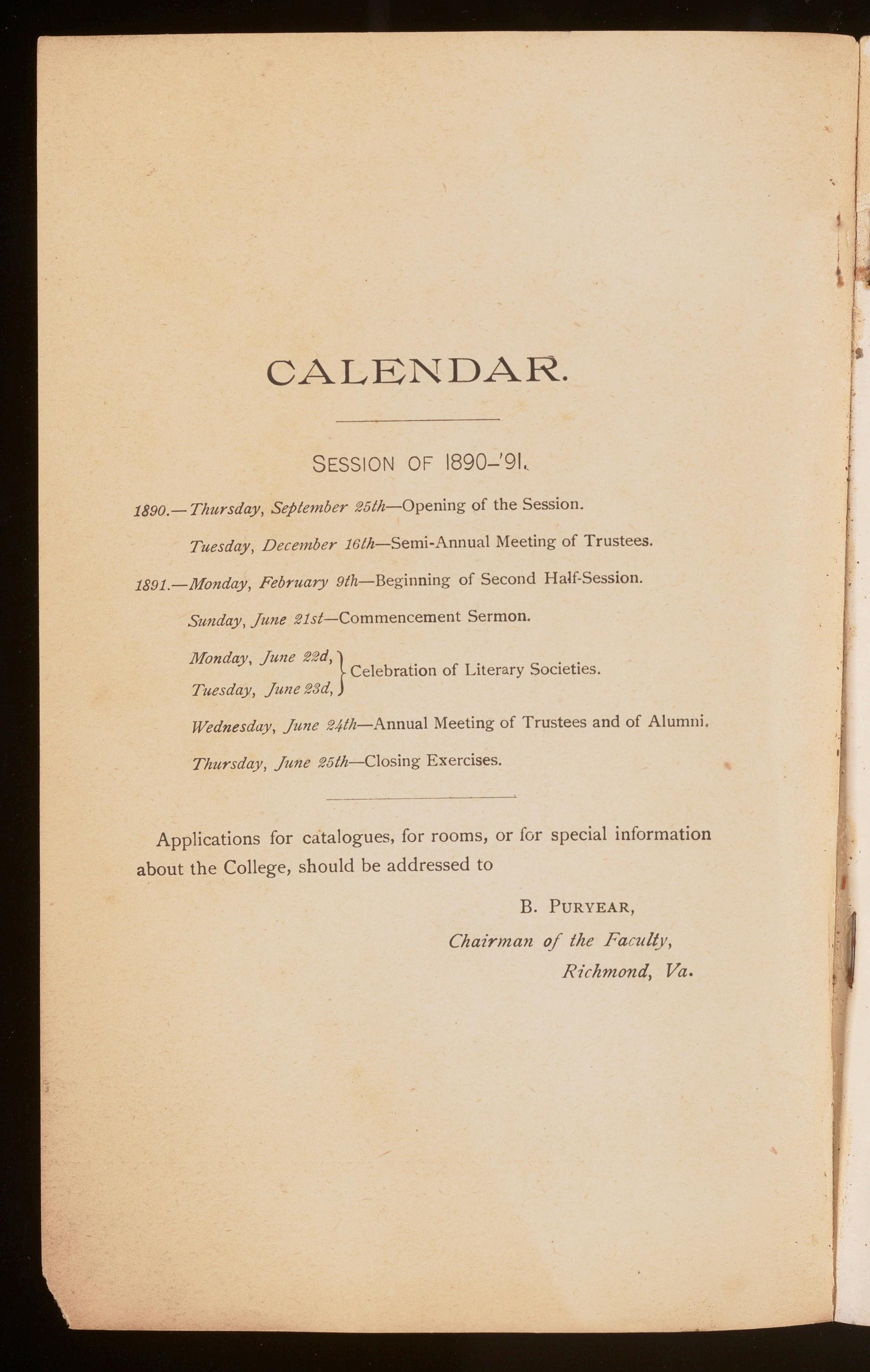



1890.-Thursday, September 25th-Opening of the Session. Tuesday, December 16th-Semi-Annual Meeting of Trustees.
1891.-Monday, February 9th-Beginning of Second Half-Session. Sunday, June 21st-Commencement Sermon.
Monday, June 22d,} Celebration of Literary Societies. Tuesday, June 23d, Wednesday, June 24th-Annual Meeting of Trustees and of Alumni. Thursday, June 25th-Closing Exercises.
Applications for catalogues, for rooms, or for special information about the College, should be addressed to
B. PURYEAR, Chairman o.f tlie Fa culty, Richmond, Va.


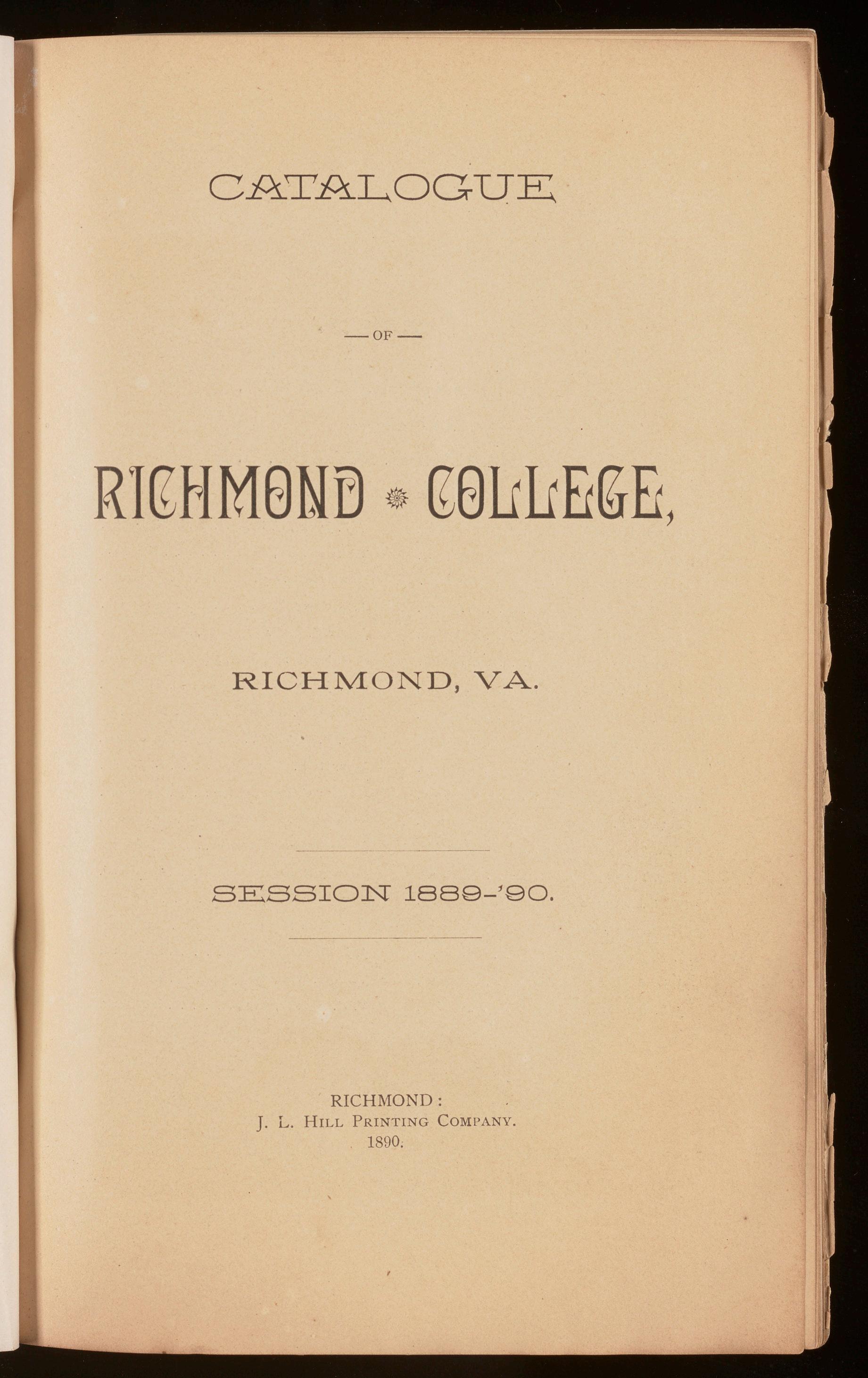
SESSION 1888- 1 80.
RIC H MON D: J. L. HILL PRINTING COMPANY. 1890.
Hon. HENRY K. ELLYSON, PRESIDENT.
RECORDING SECRETARY, FINANCIAL SECRETARY, AND TREASURER.
JOSIAH RYLAND, ESQ,, .. . Richmond.
MAJORA. R. CouRTNRY,. Richmond.
J. C L oNG, D. D,, LL. D., .. Chester, Pa.
H. K, ELLYSON, EsQ,, Richmond.
J, ALFRED JONES, LL. D.,. • Ri chmond.
J. CHRISTIAN, LL. D., ..
w. E. HATCHRR, D, D .,.
A. E DICKINSON, D. D.,.
JOHN C. W1LLIA:\1S 1 E sQ.,.
J. R. GARLICK, D. D'.
C. H. RYt.A'1D, D, D,,.
CoL. W. E TANNER, GEN, JA)IBS G. FIELD, '

C. F, JAME>, D. D., .• Roanoke.
THOMAS TABB, EsQ., . Hampt on, GaoRGE B. STREL, D. D, S., Richmond.
A E, OwRN, D. D,, .•. , •. Portsmouth, JUDGE W. R. BARKESDALE,, Halifax C, H ,
C. V. MEREDITH, EsQ., CoL. JoHN H, Guv, .. Richmond. Richmond.
. Richmond.
, Richmond. Bruington.
• Richmond. Richmond.
, Gordonsville.
. Richmond.
H. A TUPPRR, D, D., •• Richmond. Richmond.
T. S. DuNAWAY,D. D., .. Fredericksburg.
H. WYTHR DAVIS, M. D., Richmond, I. B. ;LAKE,D. D., .. , ... Rectortown
J. L. M. CURRY, LL. D., .... Richmond.
J. L. BuRaows, D. D,, •.... Norfolk.
JUDGE B. T. GUNTER, Ac comack C. H, REV. R. R. ACREE, ' ••
HoN. H. R POLLARD, GaoRGR CooPER, D. D., . Petersburg. . Richmond. . Richmond
WILLIAM W. LANDRUM, D. D.,. R ichmond.
JUDGE GEORGEH. SWANN,, ... Fincastle. CONWAYR, SANDS, Es Q,,, ... Richmond.
REV. JoHK R. BAGBY,. , REV, JOHN III, PILCHER,' J. J, MoNTAGua, EsQ.,, , . Ballsville. , Petersburg, . Richmond, THOS. C. WILLIAMS, JR., ESQ,,. Richmond.
T, H. ELLBTT, Esc,,. Richmond.
~$tanding~omm
HON. H. K. ELLYSON ....... .• PRESIDENT, C. H. RYLAND, D. D., .........• SECRETARY, Ex-officio members of committees.
Finan c e.
JOHN C. \V11:.Lr.u1s,
HENRY R POLLARD, H. WYTHE DAYIS, J. J MONTAGUE, THO~IAS C. \VILLIA~IS, JR.
H. A TUPPER, JOSIAH RYLAND,
W. \\'. L.\NDRmI, w. E. HATCHER,
\V. E. HATCHER, GEORGE COOPER,
w. E. HATCHER,
T. S. DUNA\\"AY, B T. Gt:NTER,
\V. E. HATCHER, H. K. ELLYSON, H. H. HARRIS ,
Gro unds and B uil di ngs.
JAS. ALFRED Jmrns, \V. vv.LANDRu~r,
A. E. DICKINSON. I nstruc t i on.
A. E. OWEN. Li b rary.
H. H. HARRIS.
GEORGE COOPER, R.R. ACREE,
J. L. l\I. CURRY, C. H. WINSTON,
Sc h olarship and D onati ons
B. PURYEAR, No mina t ions.
C. F. JA~IES. E nd owm en t.
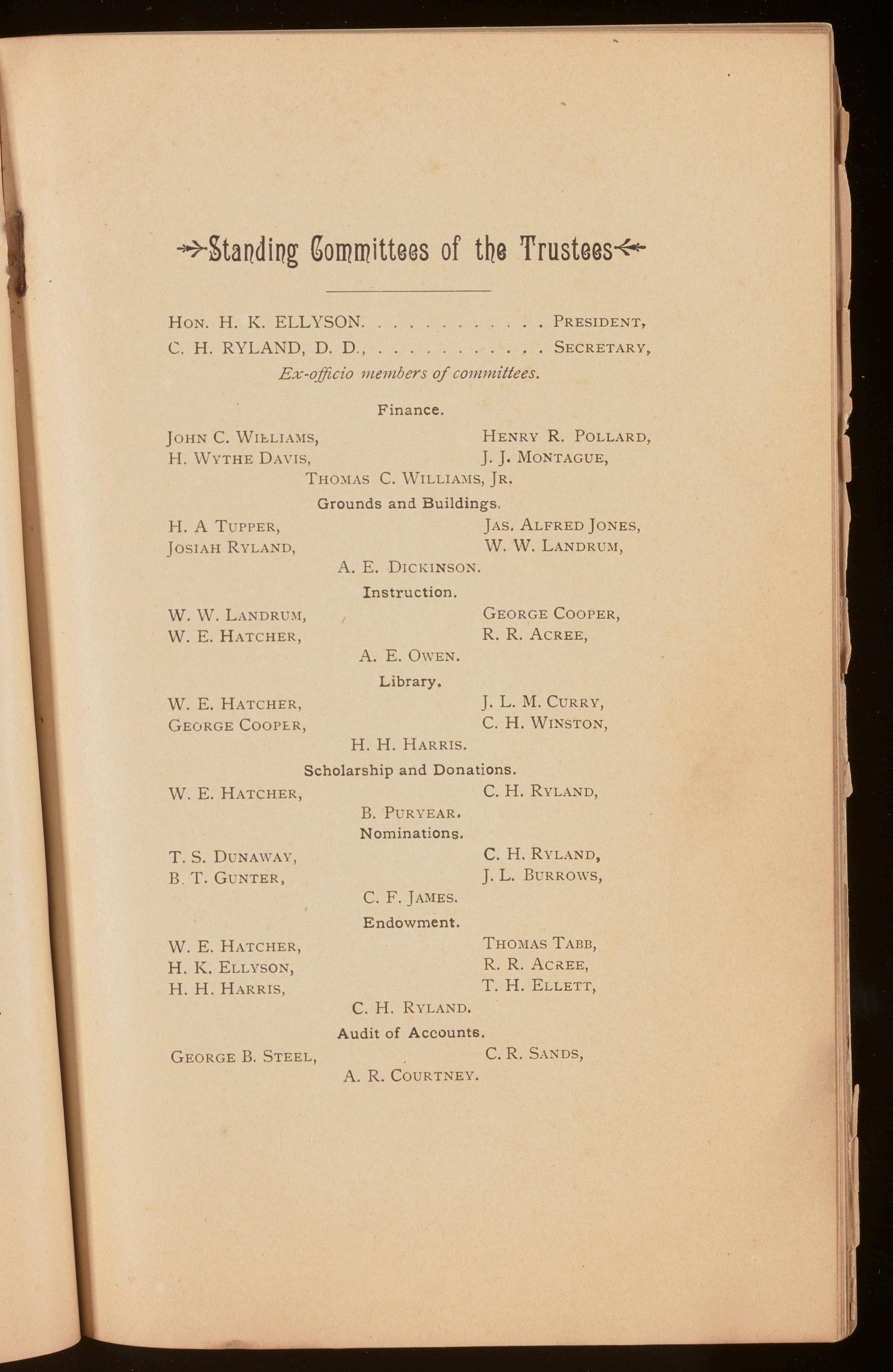
C.H. RYLAND,
C . H. RYLAND , J. L. BuRRO\\"S,
THO~IAS TABB, R.R. ACREE, T. H. ELLETT,
C.H. RYLAND
Au di t of A cc ounts .
GEORGE B. STEEL, C R. SA:-iDS, A. R. COURTNEY.
CHAIRMAN .
B. PURYEAR , LL. D .
EDMUND HARRISON , A . M ., Professor of Latin .
H . H . HARRIS , M. A ., LL. D. , Professor of Greek
JOHN POLLARD , A . M. , D . D ., Professor of English
EDWARD B . SMITH , M. A ., Professor of Mathematics.
CHARLES H . WINSTON , M . A ., LL . D ., Professor of Physics.
B . PURYEAR , A . M ., LL . D. , Professor of Chemistry.
WILL I AM D . THOMAS , M . A ., D . D ., Professor of James T homas Jr. School of Philosophy.
L. N . HASSELE FF, (Graduate Unil·er s ity of St. Petersburg), Instructor in Modern L anguages.
1. C Williams Professor of Law.

F RAN K C. JOHNSON , Instructor in Physical Cultur e.
''Tobe ele cted June 18, 189J
L.-Latin. Grk.-Greek. F.-French.
ALLISON, HENRY T., ALRICH J. ELTON, ATHEY, THO,!AS H., BAKER, EDWARDT., BAKER, JAMES P., BAUCH, CHARLES H., BINFORD, Jt:LIEN, JR., BLAIR, ADOLPHUS,JR., BLAIR, WILLIAM C., BOWDEN, ROBERT H., BRAGG, HANCOCK L., BROADDUS,JOHN A., BROCK, CHARLES B., BROWDER,JOSEPH L., BROWN,JAMES R., BROWN, WADE B., BucHANAN, W. McS., BURNETT, CHARLES R., BURNETT, HENRY C., JR., BURNETT, JESSE M., BURNLEY, HARDIN T., BusH, T. GREENE, CAMERON,ALEXANDER,JR., CAMERON,BARTONH., CARVER, 'vV. OWEN, CHAMBERS,ROBERT E., CnILDREY, JosEr11 M. T., CLEMENT, CHARLES, CLE;\IENT 'vV~1.RALl'll, COREY, HARRY s., CRADDOCK,LEWIS D.,
ABBREV IA TIO NS.
Ger.-German. E.-English. M.-Mathematics.
Fauquier Co., Va., Spotsylvania Co., Va., Fauquier Co., Va.,
Chesterfield Co., Va., Chesterfield Co., Va., Richmond, Va., Richmond, Va., Richmond, Va., Pittsylvania Co., Va., Southampton Co., Va .. Richmond, Va., Luray, Va., Richmond, Va., Danville, Va., Culpeper, Va., Culpeper, Va., Richmond, Va., Richmond, Va., Richmond, Va., Tennessee, Henrico Co., Va., Mobile, Ala., Richmond, Va., Richmond, Va., Tennessee, Baltimore, Mel., Richmond, Va, Campbell Co., Va., Richmond, Va., Richmond, Va., Richmond, Va.,

Phys.-Physics. C.-Chemistry. Phil.-Philosophy.
E., C., Phil.
L., E., M., C. L., Grk., 1\1., C. M., Phys., Phil.
L., E., M. F., M., Phys. E., M. L., E., M., C.
L., Grk., E., M. L., Grk., E., M.
L., Grk., M. L, E., Phil. Grk., Phys., C. L., Grk., E., M. Ger., E., C., Phil.
L., Grk., M., Phys. L., Grk., E., Phil. L., E., M., Phys.
L., F., Ger., M., Phys. L., Grk., M., Phil.
L., Grk., M., Phys. L., E., Phil.
L., M., Phys.
L., E., M.
L.,Grk., F.,Ger., Phys. L., Grk., M. Phys., C. L., Grk., M.
L., Grk., M., L., Grk., E., M.
L., Grk., M., Phys. L., Grk., M.,
6 Richmond College.
CRAWFORD,JOHN F., Charlotte Co., Va., L., Grk., M., C. CRITTENDEN, C. c., Nottoway Co., Va., L., Ger., M., C.
DEAN, A. F., Scott Co., Va., L., Grk., E., Phil. DECKER, NELSON C., Fredericksburg, Va., L., E., M., C. DICKINSON, CHARLES S., Richmond, Va., L., Grk., E. M. DILLARD, EDWARD F., Fluvanna Co., Va., L., Grk., E. DUDLEY, EM~IET E., Franklin Co., Va., L., Grk., E., Phys. DUKE, CLAUDE \V., Nansemond Co., Va., L.,Grk.,M.,Phys.,Phil.
DUKE, FRANK \V., Richmond, \' a., L, E., M., Phys. DUNAWAY,THOMAS S., Loudoun Co., Va., L., Grk., E., I\L
ESTES, PATRICK M., Tennessee, F., E., C., Phil. ETCHISON, JOHN E., JR., Richmond, Va., L., E., M.
FARRAR, WILLIAM E., Albemarle Co., Va., Grk., F., Ger., E., Phil. FARRAR, VI\'IAN, Richmond, Va., L., Grk., E., 1\1. FENNELL, A. LEE, Cynthiana, Ky., F., Ger., Phys., C. Fox, CHARLES B., Albemarle Co., Va., L., E., 1\1.
FRANKLIN, JAMES H., Appomattox Co., Va., L., Grk., 1\1., Phys. FRENCH, J. VIVIAN, Cumberland Co., Va., L., F., Ger., E. GOODWIN, CHARLES E. Richmond, Va., L., E.
GOODWIN, WILLIAM A., Wytheville, Va., Grk., Phys., C., Phil. GREANER, ED~1UNDW., Baltimore, Md., L., Grk., M., Phil. GRIZZARD, ROBERT W., Southampton Co., Va., L., Grk., M., Phys. .. GWATHMEY,A. BINFORD, New York, L., F., Ger., M.
HAMBLETON, GEORGE F., Louisa Co., Va., L., Grk., E., M. HANDY, S. SPEIDEN, Pocomoke City, Md., Grk., E., Phil. HARRIS, J. FRANKLIN, Culpeper, Va., E., C., Phil. HARRIS, N. H., Orange Co., Va .. F., Ger., E., C. HARRISON, EDMUND, JR., Richmond, Va., L., Grk., M. HARRISON, I. CARRINGTON, Amelia Co., Va' F., Ger., E., M., Phil. HARRISON, JOHNS., Richmond, Va., Grk., E., C., Phil. HART, JACOBD., Tennessee, L., Grk., E., M. HARWOOD, JAMES C., Richmond, Va., L., Grk., M. HATCHER, HARVEY, JR., Atlanta, Ga., L., Grk., E., 1\1. HATCHER, ROBERT w., Montgomery Co., Va., L., Grk., Ger., !\I. HAYES, WILLIAM L., Petersburg, Va., L., Grk., E., M. HEARON, SAM. M., Paris, Texas, L., E., M. HEATON, NATHANIEL, JR , Loudoun Co., Va,, E., M., C. HENDERSON, W. A., Baltimore, Md., L., Grk., E., M. HIDEN, ROBERT G., Eufaula, Ala., E., C., Phil. HIXSON, JAMES E., Mount Airy, Tenn., L., Grk., E., M. HOBBS, LE\\'Tli:R F., Hampton, Va., L., Grk., E., M. HOOVER, MILTONJ., Bath Co., Va., L., Grk., E., M., Phys.


Roll of Students. 7
HUNT.ER, MAURICE, Richmond, Va., E.,M.,C. HURT, A. }l:DSON, Powhatan Co., Va., E., C., Phil. HURT, WILLIAM E., Powhatan Co., Va., Grk., Ger., E., C. HUTCHISON J. EDWIN, Summers, \V. Va., L., Grk., M.
}AMES, CLAYBROOK, Richmond, Va., E., C., Phil. JAMES, \\TILLIAM B., Surry Co., Va., L., Grk., E., M. JOHNSON, FRANK C., Lynchburg, Va ., L., Grk., M. JOHNSON, GEORGE W., Leetown, \V. Va., L., Grk., M., E. JOHNSON, J. NEWTON, Boydton, Va., E, M., C.
JONES, CHAP:YIANW., Appomattox Co., Va., L., E., M., C. }ONES, HAYDN E., Schuylkill, Pa., L., Grk., E., Phil. JONES. WILLIAM M., Richmond, Va., L., Grk., E., M.
KEEFE, WILLIAM R. Norfolk, Va., L., Grk., E., M. KrNCANON, CHARLES T., \Vashington Co., Va., Ger., E., M., Phil. KING, FAYETTE}., Hampton, Va., L., F., Ger., M. KING, FREDERICK W., Florida, F., Ger., M., Phys., C.
LACY, SAMUELL., Richmond, Va., L., Grk, E. Lmns, GEORGE E., Madison Co., Va., L., E l\L LIBBY, STANHOPE, Richmond, Va., L., E., M LIGHT, Tn10THY L., Patrick Co., Va., L., E., M. LONG, CHARLES M., Pennsylvania, L., Grk., Phys., C .. LONG, JOSEPH R., Pennsylvania, Grk., E., M., Phil. LOUTHAN, ALEXANDER D., Fauquier Co., Va., L., Grk., M. LOUTHAN, HENRY T., Clarke Co., Va., Grk., M., C., Phil. LOVING, WILLIA:\! B., Albemarle Co., Va., L., Grk., Ger., E., M
MARTIN, RA\YLEYW., Pittsylvania Co., Va., L., F., Ger., M. MAY, J. GOODWIN, Louisa Co., Va., L., F., Ger., M., C. MCGARITY, WILLIAM B., Atlanta, Ga., F., Ger., Phys. McGEHEE, W. H. 0., Richmond, Va., L., Grk., E., M. McGUIRE, MURRAY M., Richmond, Va., M. MELTON, SPARKS W., Fluvanna Co., Va., L., Grk., E., C. MILLER, CLIFTON M., Richmond, Va., L., Grk., M., Phys. MONTGOMERY,CAL. A., Hanover Co., Va., L., E., M.
NOFTSINGER, J. EUBANK, Botetourt Co., Va., Grk., E., C., Phil. NORVELL, FRANK T., Goochland Co., Va., F., Ger., C., Phil. O'NE \L, ALFRED B., Pennsylvania, L., Grk., E.
PATTERSON, CARROLL W., Richmond, Va., L., Grk., E., M. PATTON, ALLEN G., Union, Vv.Va., L., E., M., C. PENICK, RAWLEY M., Shreveport, La,, L., F., Ger., Phys., C. PERDUE, JAMES R., Manchester, Va., M., Phys., C. PHAUP, E. A., Chesterfield, Va., L., Grk., M.

8
PILCHER, EDWIN M., POLLARD, J. GARLAND, PROVENCE, HERBERT W.,
RAMSEY, ANDREW J.,
REA:\IS, JOHN W., REID, E. E,1MET, ROBINS, CLAIBORNE, ROBINSON, BASE B., RUCKER, DANIEL H., RUDD, R. H. L., RYLAND, GARNETT, RYLAND, JOHNS., RYLAND, \VALTER H.,
SANDERS, CHARLES E., SCANLAND, F. E., SCOTT, DAVID H., SHELTON, \V. PENICK, SMITH, C. DOWNING, S,IITH, \V. LAWRENCE, SPENCER,B.FLOURNO~ SPOTTS, AUSTIN P., STREET, HENRY H., STRINGFELLOW, B. B., STRINGFELLOW, J. B.,
TAYLOR, CHARLES T., TAYLOR, JOSEPH E., THO)!AS, MAURICE W., TRUMBO, CHARLES G.,
VANBUREN, ARTHUR B., VANBUREN, EDWARD,
WAITE, CHARLES M., WALTHALL, DAVID K., WARREN, WILLIAM F., WEST, WILLIA)[ J., WHITE, RICHARD H., WHITEHEAD, J. HURT, WHITFIELD, GEORGE H., WHITLOCK, EDWARD M., WICKER, JOHN JORDAN, WICKS, HARRY OSBORN, WILLIAMS, FRANK, JR., WILLIAMS, HERBERT F.,
Richmond College. Petersburg, Va., Richmond, Va., Lake Weir, Fla., Franklin, Va., Charlotte Co., Va., Maryland, Richmond, Va., California, Fauquier Co., Va., Chesterfield Co., Va., Richmond, Va., Lunenburg Co, Va., Middlesex Co., Va., Orange Co., Va., Fairfax Co, Va., Richmond, Va., Richmond, Va., Richmond, Va., Richmond, Va., King William Co., Va., Richmond, Va., Lunenburg Co., Va., Richmond, Va., Culpeper, Va.,
Chesterfield Co.; Va., Richmond, Va., Maryland, Rockingham Co., Va.,
Richmond, Va., Richmond, Va., Culpeper, Va., Richmond, Va., Dallas, Texas, Richmond, Va., Hampton, Va., Pittsylvania Co., Va., Richmond Va., Powhatan Co., Va., Richmond, Va., Baltimore, Md., Fairfax Co., Va., Fairfax Co., Va.,
L., M., Phys., Phil. L.,Grk.,E.,M.,C.,Phil. L., Grk., l\f., Phys. L.,Grk.,F.,Ger.,E.,Phil E., C., Phil. L., Grk., M., Phys. L., E., l\L, L., E., M., Phys. Grk., E., M., C. Phil. L., E., !\I. Grk., F 1\1., C. L., M., C. L., Grk., M., Phys. L., Grk., Phil. L., Grk., E.,M. L., F., Ger., E., M. E., l\f., Phys. L., Grk. L., Grk., M. L., Grk., Ger., l\L L., Grk., C., Phil. E., C., Phil. L., F., Ger., C. L., F., Ger., 1\1., C.
Grk., E., Phil. Grk., F., Phys. Grk.,Ger., E.,C., Phil. L., Grk., 1\1.,C.
L., E., 1\1. E. M. C.
L., Ger., M. [Phil. L.,Grk.,F.,Ger ,Phys, L., Grk., M., Phys. L.,Grk., F., Ger., Phil. L., Grk., E , M. L.,Grk., F.,Ger., Phil. L., Grk., M. L., Grk., M., Phil. L.,Grk., Ger., E., Phil. Grk., E., M. L., Grk., E., 1\1. L., Grk.
WILLIAMS, RUSSELL C., WILLIA~IS, WESLEY C., WINFREY EGBERT B., WINSTON, JOHN G., WINSTON, PETER, WRIGHT, E~rMET P., YARBROUGH,CHARLESC., YOUNG, SAMUEi. J.,
Roll of Students.
Richmond, Va., Richmond, Va., Buckingham Co., Va., Richmond, Va., Richmond, Va., Bedford Co., Va., Mountain City, Tenn., Manchester, Va.
RECAPITULATION.
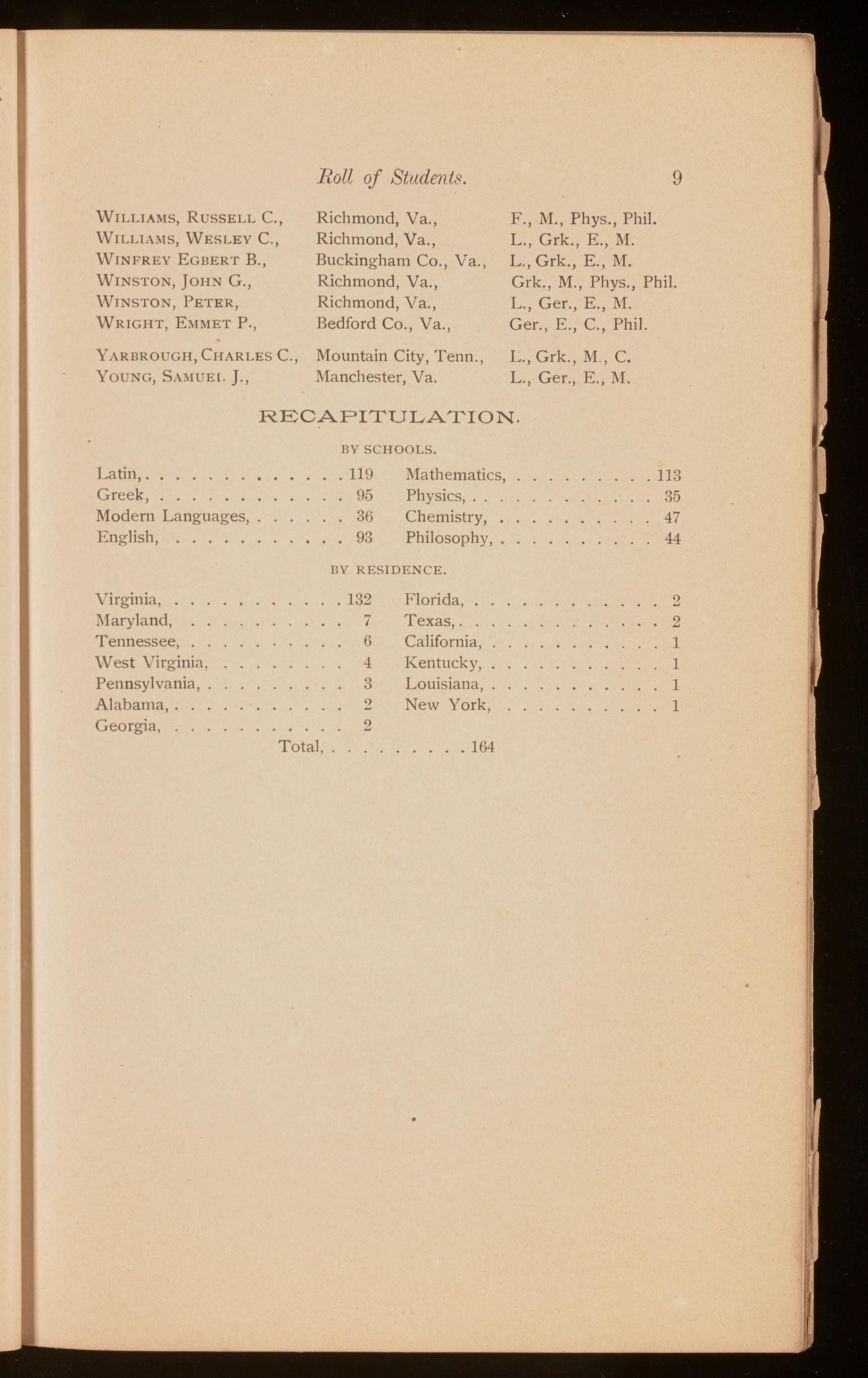
F., M., Phys., Phil. L., Grk., E., M. L., Grk., E., M. 9 Grk., M., Phys., Phil. L., Ger., E., M. Ger., E., C., Phil. L., Grk., M., C. L., Ger., E., M.

The aim of Richmond College is to lay broad and deep foundations for solid learning. The attainment of its honors depends on honest work and a thorough mastery of what is required. During the fifty-six years since its establishment as a seminary, the Trustees have always cared more for real worth than for mere show; the Faculty have constantly insisted on steady indu,,try, rigid examinations, and a high standard for graduation ; the students have generously responded to these demands, aimed at true scholarship, and worked faithfully for its attainment. And so, by the blessing of God, the College has grown slowly to its present measure of success, and promises to continue a healthy growth in the same line. All its traditions and all its hopes require it to offer the best facilities for a sound, liberal education at the lowest possible cost to the student.
The founders of the College showed rare wisdom and foresight in selecting a location. Richmond is easy of access from every quarter, contains varied and extensive manufacturing establishments, and is a commercial, political, and religious centre. It therefore furnishes many incentives to study, many aids to culture. The temptations to young men away from home are not greater than in a village, and are counteracted by the better police regulations, and by the wholesome moral tone of an exceptionally religious city.
In latitude it lies about midway between the rigors of the north and the relaxing heat of the south. The nine months of the scholastic year have few days either too cold or too hot for comfort in studying or in outdoor exercise. By its elevation-on hills opposite the falls of the Jam es-it is free alike from the malaria of tide-water and from the pulmonary and enteric diseases of the mountain region. For twenty-two years there have been only three deaths in the College, and few other serious tases of sickness-none that could be ascribed to local causes.
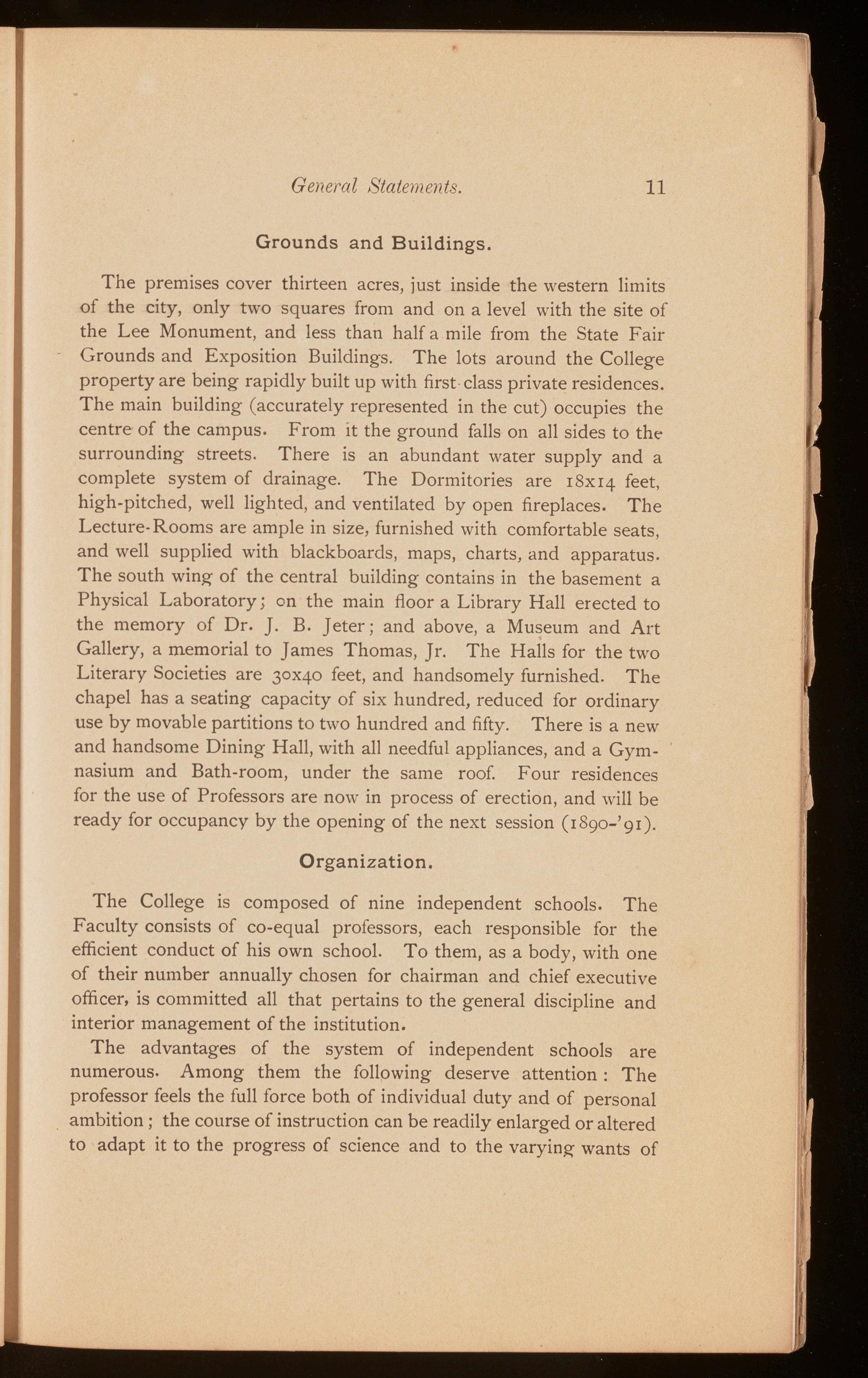
The premises cover thirteen acres, just inside the western limits of the city, only two squares from and on a level with the site of the Lee Monument, and less than half a mile from the State Fair Grounds and Exposition Buildings. The lots around the College property are being rapidly built up with first class private residences. The main building (accurately represented in the cut) occupies the centre of the campus. From it the ground falls on all sides to the surrounding streets. There is an abundant water supply and a complete system of drainage. The Dormitories are 18x14 feet, high-pitched, well lighted, and ventilated by open fireplaces. The Lecture-Rooms are ample in size, furnished with comfortable seats, and well supplied with blackboards, maps, charts, and apparatus. The south wing of the central building contains in the basement a Physical Laboratory; on the main floor a Library Hall erected to the memory of Dr. J. B. Jeter; and above, a Museum and Art Gallery, a memorial to James Thomas, Jr. The Halls for the two Literary Societies are 3ox40 feet, and handsomely furnished. The chapel has a seating capacity of six hundred, reduced for ordinary use by movable partitions to two hundred and fifty. There is a new and handsome Dining Hall, with all needful appliances, and a Gymnasium and Bath-room, under the same roof. Four residences for the use of Professors are now in process of erection, and will be ready for occupancy by the opening of the next session (1890-'91).
The College is composed of nine independent schools. The Faculty consists of co-equal professors, each responsible for the efficient conduct of his own school. To them, as a body, with one of their number annually chosen for chairman and chief executive officer, is committed all that pertains to the general discipline and interior management of the institution.
The advantages of the system of independent schools are numerous. Among them the following deserve attention : The professor feels the full force both of individual duty and of personal ambition ; the course of instruction can be readily enlarged or altered to adapt it to the progress of science and to the varying- wants of
12

Ri chmond College.
the times; the student, whose aims or preparation require, can select a course suited to his peculiar case; he can enter, in any department of study, the classes for which he is prepared, and deficiency in one branch does not retard him in another; students are not divided into fixed classts and grades, but all stand on a footing of social equality, and mingle freely with one another; the whole system favors the utmost thoroughness of culture, even at the expense of less extensiveness in superficial attainments; the d egrees, being awarded to fewer persons than under a curriculum, are therefore of more value; and every good student, whether he takes a degree or not, receives a testimonial to his success in the shape of Certificates or School Diplomas.
The deportment of a Christian gentleman is the standard to which every student is expected to conform. All appropriate means are used to develop and confirm a sense of personal honor and sacred regard for truth, as upon these rests the best reliance for good conduct. A few plain and reasonable rules, for the good of the whole body, are prescribed by the Faculty, and a copy furnished to each matriculate. Any who wantonly violate these regulations, habitually neglect their duties, or are not regular and punctual in attendance on lectures and recitations, will be required to withdraw from College.
Students have easy access to all the advantages afforded by the various city churches, with their Bible classes and Sunday schools. Those who are professors of religion may bring with them letters of commendation, and, without severing their ecclesiastical connections at home, attach themselves while here to some church, so as to have the sympathy and care of a pastor. The daily duties of the College are opened with brief devotional exercises, conducted by one of the Professors; and prayer-meetings, conducted by the students themselves, are held twice or oftener every week. Attendance on religious exercises is entirely voluntary, as experience has shown that such a course is best in its results.
A course of lectures introductory to the Bible is also provided, and varied from year to year. These lectures, open without fee to
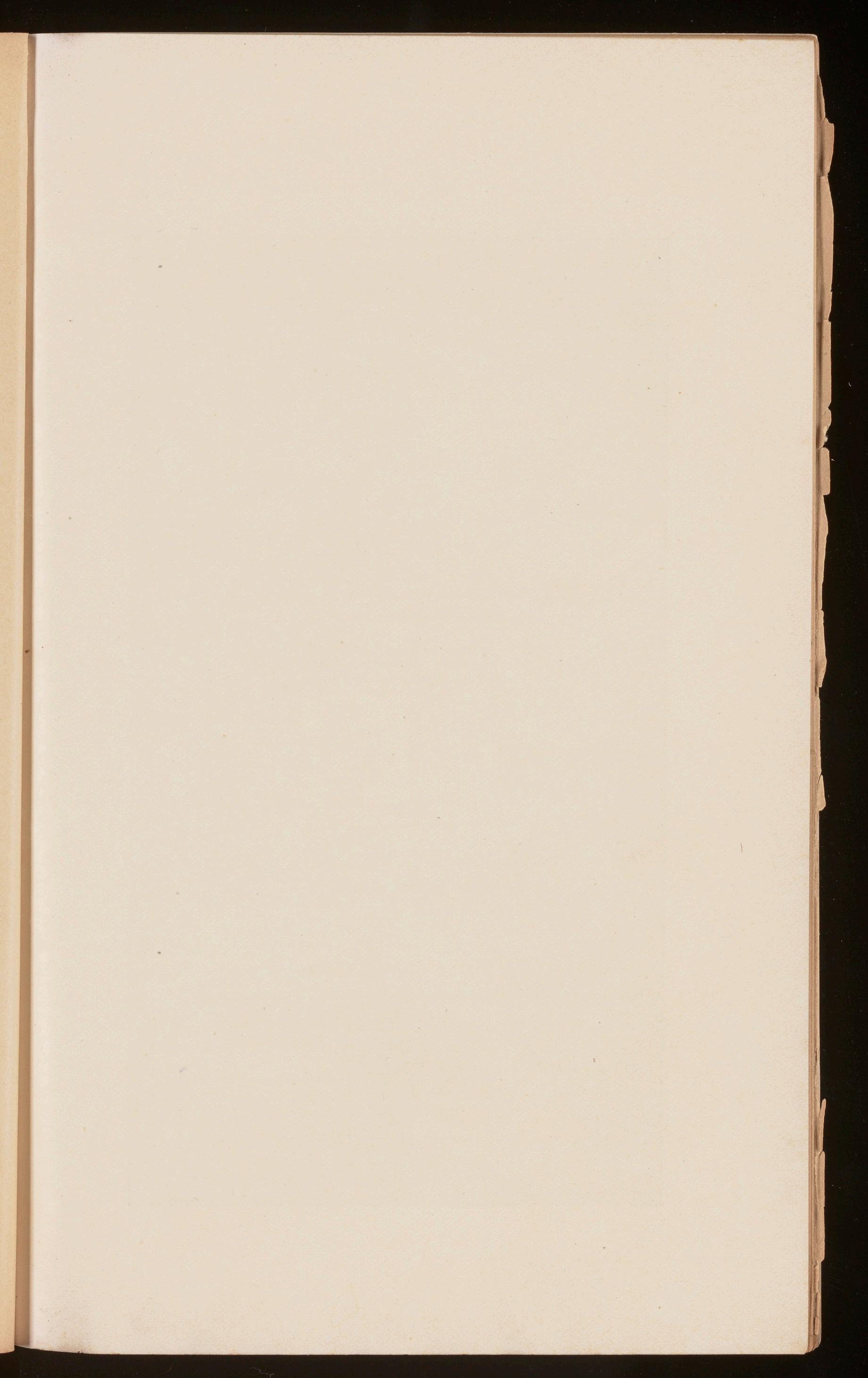

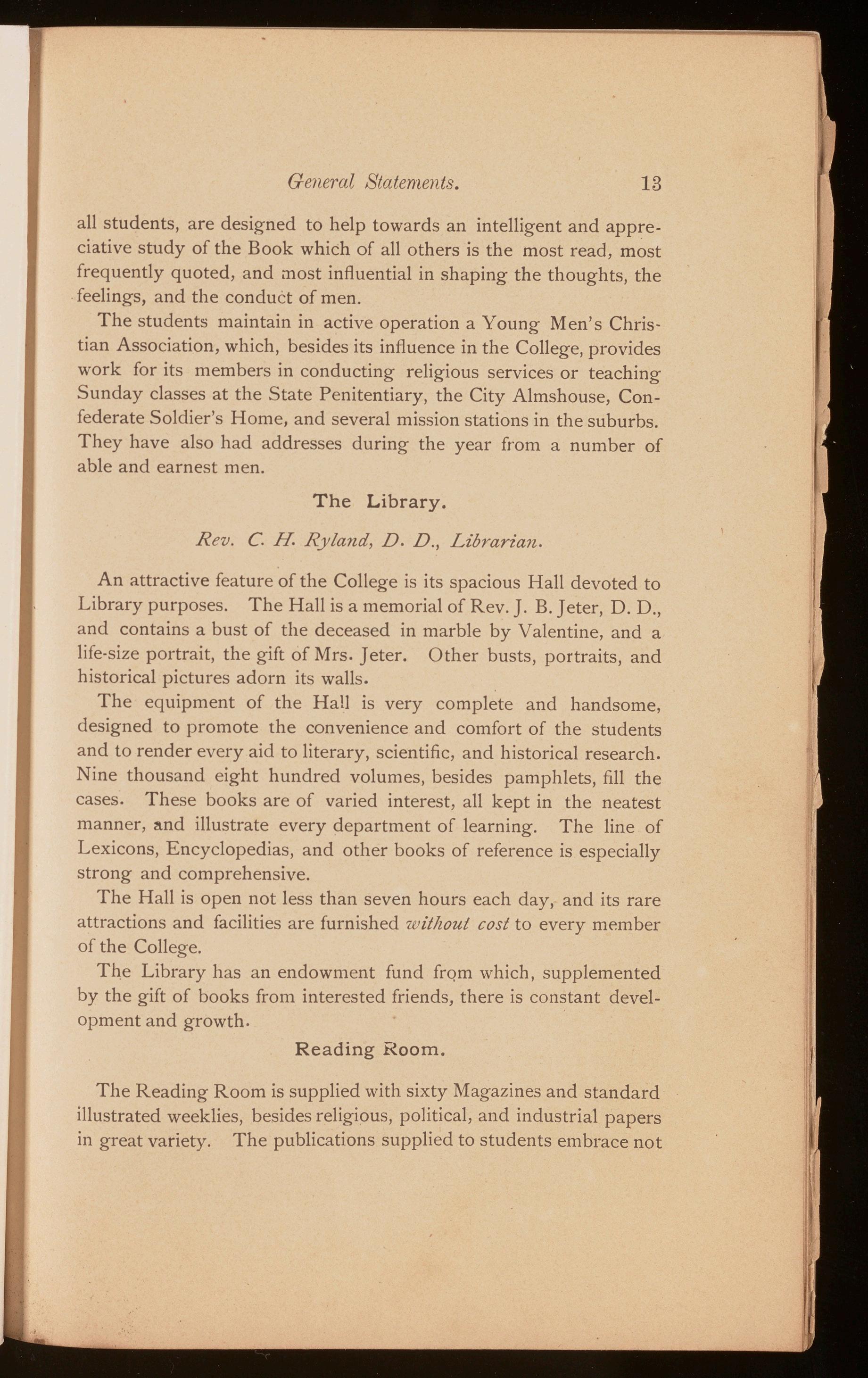
Statements.
all students, are designed to help towards an intelligent and appreciative study of the Book which of all others is the most read, most frequently quoted, and .nost influential in shaping the thoughts, the feelings, and the conduct of men.
The students maintain in active operation a Young Men's Christian Association, which, besides its influence in the College, provides work for its members in conducting religious services or teaching Sunday classes at the State Penitentiary, the City Almshouse, Confederate Soldier's Home, and several mission stations in the suburbs. They have also had addresses during the year from a number of able and earnest men.
Rev. C.H. Ryland, D. D., Librarian.
An attractive feature of the College is its spacious Hall devoted to Library purposes. The Hall is a memorial of Rev. J. B. Jeter, D. D., and contains a bust of the deceased in marble by Valentine, and a life-size portrait, the gift of Mrs. Jeter. Other busts, portraits, and historical pictures adorn its walls.
The equipment of the Hall is very complete and handsome, designed to promote the convenience and comfort of the students and to render every aid to literary, scientific, and historical research. Nine thousand eight hundred volumes, besides pamphlets, fill the cases. These books are of varied interest, all kept in the neatest manner, 11.ndillustrate every department of learning. The line of Lexicons, Encyclopedias, and other books of reference is especially strong and comprehensive.
The Hall is open not less than seven hours each day, and its rare attractions and facilities are furnished w ithout cost to every member of the College.
The Library has an endowment fund frqm which, supplemented by the gift of books from interested friends, there is constant development and growth.
The Reading Room is supplied with sixty Magazines and standard illustrated weeklies, besides religious, political, and industrial papers in great variety. The publications supplied to students embrace not
1-!

Richmond College.
only the current literature of the day and of the country, but leading foreign journals in several languages. For Bible study a liberal supply of the most helpful papers, with the newest and best Commentaries, are placed within easy reach of all. Museum.
The elegant Hall above the Library, finished in hard wood and fresco, built by the Trustees and dedicated to the memory of James Thomas Jr. is designed to be the home of all Art and Museum treasures. By the liberality of Mrs. Thomas a fund has been started for the suitable equipment of the Hall and the appropriate mounting of the growing collection of mineralogical and archceological specimens and curios from our own and foreign lands.
This department furnishes many hours of instructive recreation to students, and attracts many interested visitors.
The Museum is in charge of the Library Committee, and the Librarian is curator.
Public Lectures.
A donation of ten thousand dollars, made by the widow and children of the late James Thomas Jr. and known as the" Thomas Museum Lecture Endowment," is used to secure annually at the College, and open to the public, a course of from three to five lectures by some eminent man of our own or another country, on subjects either of Science or of Philosophy or of Art. During the past session the lectures were by Dr. William T. Harris, United States Commissioner of Education, on Art.
Physical Culture.
By the liberality of Mr. B. F. Johnson, of Richmond, a regular course of gymnastic drill and instruction has been provided. Every student who chooses to ·avail himself of the privilege is carefully examined to discover any defect of nature or of habit, and has specially assigned to him the kind and amount of exercise deemed most suitable to remedy the evil and promote symmetrical development. These classes are organized for regular drill, half an hour a day, with suitable apparatus and appliances. The system in use the past session by Frank C. Johnson, Director, is that of Dr. Roberts,

General Statements. 15 of the Y. M. C. A. School at Springfield. It aims not at muscle building for the purpose of athletic display, but at moderate and healthful exercise, especially of the heart and lungs. The thoroughly scientific basis of the system has been fully attested by its excellent results in preserving health and promoting successful study.
The students maintain two Societies, meeting weekly for declamation, debate, and other literary exercises, and for the publication of a monthly pamphlet of forty double-column pages, known as Tlze Messenger. The Societies cultivate a generous rivalry, not only with each other, but among their own members, by offering each two medals-one for the best debater, the other for greatest improvement during the session, and jointly a medal for the best writer.
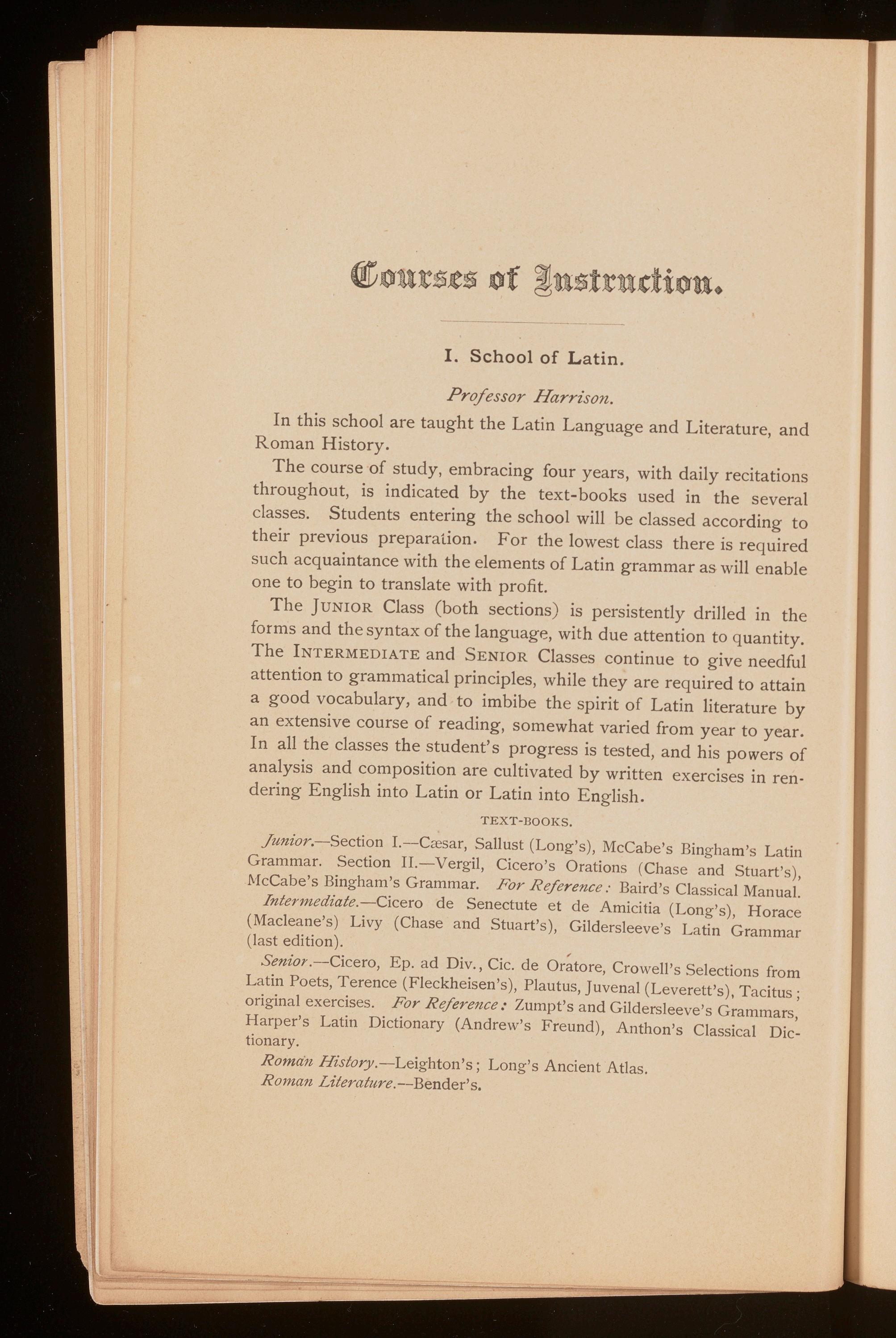
I. School of Latin.
Prefessor Harrison.
In this school are taught the Latin Language and Literature, and Roman History.
The course of study, embracing four years, with daily recitations throughout, is indicated by the text-books used in the several classes. Students entering the school will be classed according to their previous preparation. For the lowest class there is required such acquaintance with the elements of Latin grammar as will enable one to begin to translate with profit.
The JUNIOR Class (both sections) is persistently drilled in the forms and the syntax of the language, with due attention to quantity. The INTERMEDIATE and SENIOR Classes continue to give needful attention to grammatical principles, while they are required to attain a good vocabulary, and to imbibe the spirit of Latin literature by an extensive course of reading, somewhat varied from year to year. In all the classes the student's progress is tested, and his powers of analysis and composition are cultivated by written exercises in ren- dering English into Latin or Latin into English.
TEXT-BOOKS.
Junior.-Section I.-C:esar, Sallust (Long's), McCabe's Bingham's Latin Grammar. Section II.-Vergil, Cicero's Orations (Chase and Stuart's), l\IcCabe's Bingham's Grammar. For Reference: Baird's Classical Manual. Intermediate.-Cicero de Senectute et de Amicitia (Long's), Horace (Macleane's) Livy (Chase and Stuart's), Gildersleeve's Latin Grammar (last edition). ,
Senior .-Cicero, Ep. ad Div., Cic. de Ora tore, Crowell's Selections from Latin Poets, Terence (Fleckheisen's), Plautus, Juvenal (Leverett's), Tacitus; original exercises. For Reference: Zumpt's and Gildersleeve's Grammars, Harper's Latin Dictionary (Andrew's Freund), Anthon's Classical Dic- tionary.
Roman History.-Leighton's; Long's Ancient Atlas. Roman Literatitre.--Bender's.

Projessor Harris.
This School embraces the forms and structure of the language, with an introduction to the history, literature, and art of the ancient Greeks. These subjects are distributed into four classes, each meeting five times a week. Written exercises, translations of English into Greek, or the reverse, are required at least weekly, in every class. The aim throughout the course is twofold-first, to cultivate habits of minute attention and nice discrimination; secondly, to awaken appreciation of the excellencies of Hellenic genius.
The JUNIOR Class-Section I-begins with the alphabet, and advancing slowly, with daily exercises and frequent reviews, is occupied mainly in mastering the regular inflections of nouns and verbs. Section II continues the study of the grammar, but devotes more time to translating simple Attic prose. The INTERMEDIATE Class is occupied mainly with reading, giving, however, one day a week to Greek History and one to further study of etymology and to the elements of syntax, such as the use of the article, the cases, tenses, and moods. The SENIOR reads from more difficult authors, surveys the literature, and reviews the grammar with special reference to the principles which underlie seeming irregularities and dialectic differences, as well as to some of the niceties of syntax.
Graduates and members of the Senior Class will have opportunity to form a class to read the New Testament in the original.
TEXT-BOOKS.
Jzmior.-Section I: Harkness' First Greek Book (Revised Edition), Xenophon's Ana basis, Fyffe's History of Greece. Section II : Allen's Hadley's Grammar, Anabasis, Lysias (Stevens' Edition), ----Prose Composition.
Intermediate.--Allen's Hadley, Prose Composition, Smith's History, Xenophon's Memorabilia, Euripides, Sophocles, Demosthenes.
Senior.--Allen's Hadley, with oral lectures and original exercises, Jevons' Greek Literature, Plato, Homer, .JEschylus, Thucydides (Ginn & Co.'s College Series of Texts, so far as published, will be used).
New Testament: Wescott and Hort's Edition.
For reference in all classes: Liddell and Scott's Lexicon, Yonge's or Hamilton's English-Greek Lexicon, and Smith's or Anthon's Classical Dictionary.

L. N Has se!eff, Instructor.
In this School are embraced the French and the German. There are two classes-Junior and Senior-in each language. The Instructor believes that the study of the living languages with which so many are constantly brought into c~ntact, either by travel or by immigration, should not be a mere accomplishment for the circle of literary life, but so practical as to enable the student not only to read, but to speak them, and, more important still, to understand them when spoken He therefore proceeds on a method elaborated by years of experience, and one in which theory and practice go side by side to conduct the student gradually from the simple elements up to a thorough knowledge of the language, and to enable him, before reaching the end of the course, to appreciate and enjoy the French and German cla!:'sics, as well as to write an~ speak the languages fluently and idiomatically.
Prof essor Pollard.
The J UNIOR Class studies in the first half session Higher English Grammar, giving special attention to etymology and grammatical analysis; in the second half session, Rhetoric, with particular reference to clear and forcible expression in speaking and writing. Lessons in Orthoepy are given every week for the purpose of pointing out to students any errors of pronunciation, and making them acquainted with the best usage in this country and England.
The INTERMEDIATEClass studies the history of English Literature, and pursues an extensive course of reading in standard authors, with constant application of the grammatical and rhetorical principles previously learned. The opportunity is embraced for helping the student to acquire the art of good reading.
The SENIOR Class studies Anglo-Saxon and Early English during first half session ; and during the second, traces the relation of our language to other tongues, and its growth from its earliest stage to its present forms and constructions.

In all the classes, during the entire session, frequent exercises in Composition are required, and are criticised in the class-room, for the double purpose of stimulating students to their best endeavors, and giving to all the benefit of the criticisms on each.
Students that propose to join the Intermediate or the Senior Class without having attended the class below must, at the beginning of the session, stand such an examination as will show that they are prepared for the class to whic,h they wish to be admitted.
TEXT-BOOKS.
Junior: Bain's Higher English Grammar, Morris' Historical Grammar, Abott's How to \,Vrite Clearly, D. J. Hill's Elements of Rhetoric.
Intermediate: D. J. Hill's Science of Rhetoric, Montgomery's Leading Facts of English History, Stopforcl Brooke's History of English Literature.
Senior: Corson's Hanel-Book of Anglo-Saxon and Early English, Herbert Spencer's Philosophy of Style, Peile's Philology, \,Vhitney's Language and Study of Language.
For Reference: Skeat's Etymological Dictionary; American Dictionaries-\Vebster and Worcester; English-Stormonth and Imperial Lexicon.
V. School of Mathematics.
Professor Smith.
In this School a course of pure Mathematics is taught, with such subjects in the applied science as are mentioned below.
The JUNIOR Class is divided into two sections. The course of study in the first section embraces Algebra, through the subject of Quadratic Equations, and Plane Geometry; in the second section, Algebra, beginning with Quadratic Equations, Geometry, and Trigonometry.
Text-books: Schuyler's Algebra, \,Ventworth's Geometry, Wells' or Chauvenet's Geometry, the Professor's Trigonometry.
The INTERMEDIATEClass reads a course of Analytical Geometry, including the methods of trilinear and tangential co-ordinates, and the theory of Equations.
Text-books: Howison's Analytical Geometry, Schuyler's Algebra.
In the SENIOR Class the course of study includes the Differential and the Integral Calculus, the Calculus of Variations, and introductory lessons in the Modern Higher Algebra and in Quaternions, closing with lectures on the Philosophy of Mathematics.

Text-books: Todhunter, Courtenay, and Salmon; the course being supplemented by notes.
The subjects of Land and Railway Surveying are taught in an additional class. The student is required to make himself familiar with the instruments used by practice in the field.
In all the classes the importance of cultivating the student's power of invention and of independent thought is constantly regarded, -and accordingly he is exercised in the demonstration and solution of original propositions and problems throughout his course of study.
Prefessor Winston.
The School of Physics embraces the several subjects usually grouped under this title, or under the practically equivalent name, Natural Philosophy. These include: The General Properties of Matter; Mechanics proper, or the cardinal doctrines of Force, Equilibrium, Motion, and Energy, in their various kinds, their relations to the several states of matter, and their practical applications; the phenomena and laws of Sound and of Light; such a treatment of Heat, Magnetism, and Static and Dynamic Electricity as is properly physical; and finally, a brief but compact course in Celestial Physics, or Astronomy.
The method of instruction is by text-books, and by lectures for the most part referring to the text, with daily examinations upon both text and lecture, and written exercises required weekly.
The new and excellent suite of rooms recently prepared for this department adds g-reatly to its comfort and efficiency, and renders possible the proposed large increase of Laboratory work to be done by students.
The JUNIOR Class, known also as the class in Experimental Physics, begins with the elements, and pursues the course with the aid of abundant experiments and illustrations, and with continual reference to practical applications. The effort is made to combine in a course of modern Physics the freshness and attractiveness of an experimental and practical treatment, with the rigorous accuracy, the scientific method, and the exact discipline which may form the basis for future scientific work. It is required, for admission to this

21 class, that the student shall have some acquaintance with Elementary Algebra and Plane Geometry.
Text-books: Gage's Physics, or Norton's Natural Philosophy, and Lockyer's or Young's Astronomy, with others for reference.
In the SENIOR Class the subjects mentioned above are again taken up in proper order, and are studied as completely as possible from the vantage ground of the knowledge already gained• in the Junior Class, and with the additional aid to be found in the free use of mathematical principles. An acquaintance with advanced Mathematics is necessary for admission to this class.
Text-books: Alfred Daniel's Principles of Natural Philosophy, Anthony and Brackett's Physics, and Newcomb and Holden's Astronomy, with others for reference.
Professor Puryear.
The lectures in this School begin with the discussion of the physical properties of the atmosphere. The following subjects are then treated in the order named: Heat; Static and Dynamic Electricity; Magnetism; Chemical Philosophy and Notation; Inorganic .and Organic Chemistry, with their application to Heating, Lighting, Mineralogy, Metallurgy, Toxicology, Agriculture, and Physiology; Geology.
During the entire course constant reference is had to the 3:.pplication of chemical facts and principles to agriculture, and a part of the instruction of this school is devoted exclusively to this object. The sources of the organic and inorganic food of plants, the formation and constitution of soils, drainage, putrescent and commercial fertilizers, the rotation of crops, the feeding of stock, and similar topics are fully considered. The course is taught principally by lectures, and is abundantly illustrated by experiments.
Text-books: Youman's New Chemistry; Roscoe's Lessons in Chemistry; Norton's Scientific Agriculture; Dana's Text-book of Geology._
Professor Thomas.
The subjects assigned to this School are divided between two classes, and students are earnestly advised to arrange their course
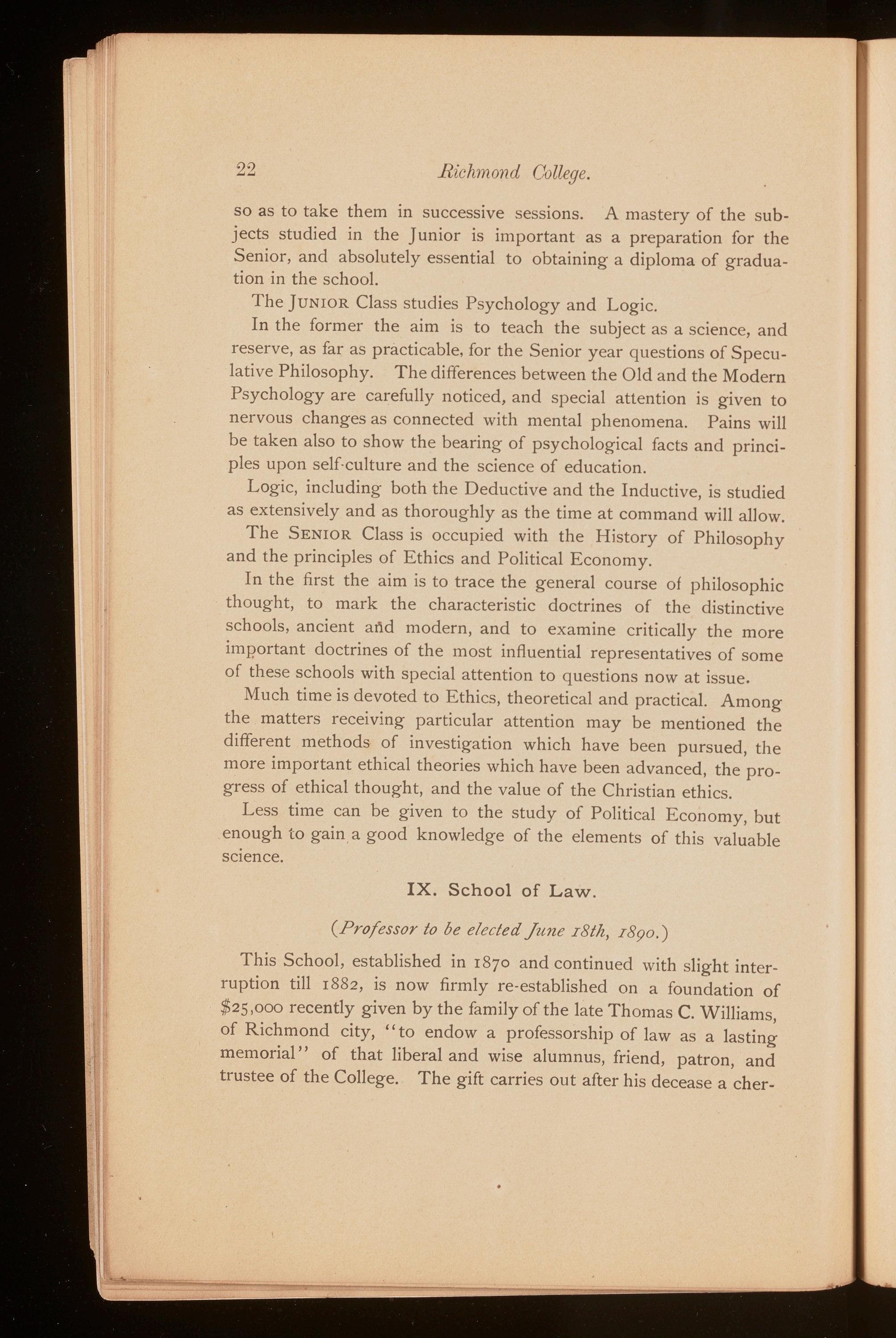
Ri chmond College.
so as to take them in successive sessions. A mastery of the subjects studied in the Junior is important as a preparation for the Senior, and absolutely essential to obtaining a diploma of graduation in the school.
The JUNIOR Class studies Psychology and Logic.
In the former the aim is to teach the subject as a science, and reserve, as far as practicable, for the Senior year questions of Speculative Philosophy. The differences between the Old and the Modern Psychology are carefully noticed, and special attention is given to nervous changes as connected with mental phenomena. Pains will be taken also to show the bearing of psychological facts and principles upon self.culture and the science of education.
Logic, including both the Deductive and the Inductive, is studied as extensively and as thoroughly as the time at command will allow.
The SENIOR Class is occupied with the History of Philosophy and the principles of Ethics and Political Economy.
In the first the aim is to trace the general course of philosophic thought, to mark the characteristic doctrines of the distinctive schools, ancient and modern, and to examine critically the more imP,ortant doctrines of the most influential representatives of some of these schools with special attention to questions now at issue.
Much time is devoted to Ethics, theoretical and practical. Among the matters receiving particular attention may be mentioned the different methods of investigation which have been pursued, the more important ethical theories which have been advanced, the progress of ethical thought, and the value of the Christian ethics.
Less time can be given to the study of Political Economy, but enough to gain a good knowledge of the elements of this valuable se1ence.
.
(Professor to be elected June r 8tli, r890.)
This School, established in 1870 and continued with slight interruption till 1882, is now firmly re-established on a foundation of $25,ooo recently given by the family of the late Thomas C. Williams, of Richmond city, "to endow a professorship of law as a lasting memorial" of that liberal and wise alumnus, friend, patron, and trustee of the College. The gift carries out after his decease a cher-
ished desire he had expressed while living to see a first-class law school in a location so eminently suitable for combining practical with theoretical instruction.
The selection of a suitable person to fill the chair will be made by the Trustees at their next annual meeting, and as early as practicable thereafter publication will be made in reference to requirements for entrance, text-books, and courses of study. It is safe to say in advance that the course will include a ·thorough study of the Common and Statute Law, as pertaining both to persons and to property, and of the principles of Equity, Mercantile, and International Law. Students will also have easy access to the numerous courtsmunicipal, State, and Federal-that sit in Richmond, and to the valuable libraries here collected.

As may be seen from the foregoing statement, instruction is conveyed by the use of approved text-books, supplemented by oral explanations and additions, and in some cases by more _ formal lectures. In every case the student is questioned on the assigned portion of the text or the previous lecture. An account of the value of his recitati 'ons and exercises is kept by the professor, and the average standing for each month is calculated and entered of record for reference in determining his right to any of the honors of the institution.
To the parent or guardian is sent, monthly, a transcript of this record of class-standing, with a statement of the absences of the student from his classes, and such other information as may be deemed important. By the prompt and judicious attention of those to whom they are addressed, these reports may be made of great value in promoting improvement and sustaining a just discipline.
Examinations.
Besides the daily questioning, every class is subjected to two general examinations conducted in writing. The Intermediate Exami-

Richmond Colle_qe.
nation, embracing in its scope the first half of the course, is held about the middle of the session. The Final Examination, held near the close of the session, embraces the subjects treated in the second half. In Senior Classes, however, examinations are not limited to what has been explicitly contained in the course of instruction, but may embrace passages or problems that have not been taken up in the class-room, together with an oral review of the whole course taught in the School, as searching and extensive as the professor may deem necessary.
For these examinations a series of questions, with certain numerical values attached, is prepared for each class. The answers furnished by each student are carefully valued, and this valuation is equitably combined with the average of his class-standing. If the mark of a student as thus ascertained amounts to eighty per centum, he is ranked in the first division; if to less than eighty, but not less than fifty per centum, in the second division; if to less than fifty, iri the third division.
Students who attain to the second division, in Junior or Intermediate Classes, will be allowed to pass on to the class above.
Certificates of Distinction are awarded to all who attain the first division ~t either examination, and their names are published or announced in the closing exercises of the session.
Certificates of Promotion are awarded to all who attain the first division at both examinations, in Junior or Intermediate Classes.
Certificates of Proficiency are conferred on all who attain the first division in certain complete subjects of study, to wit: in French, in German, in Surveying, and in Experimental Physics.
School Diplomas are conferred on all who attain the first division in the leading subjects taught in each School, to wit: Latin Language and Literature and Roman History; Greek Language, History, and Literaturej two Modern Languages; English Language and Literature; Mathematics; Physics; Chemistry; Philosophy.
Medals.
I. THE Wooos MEDAL-founded by Hiram Woods, Esq., of Baltimore, Maryland, for excellence in Declamation-is awarded annually by a committee of gentlemen after public competitive trial, open to all students.
"Reading is the fine art."-WILLARD.
For years the opinion that the yo1mg men of our institution should be better readers and speakers has been growing stronger and stronger. Provision fo_rthe special culture of our students in this direction has at last been made.
Mr. L. R. HAMBERLIN,an alumnus of this college, who is recommended by high authority as "one of the best teachers of elocution in the United States," has been appointed Instructor.
During the session of 1890-'91, instruction in this school will begin October 1st and end May 20th, with an interim from December 20th to February 20th.
Students will be trained to analytic, consequently to impressive reading and speaking. Careful discrimination will be made between "reading" and "speaking." Just attention will be given to Bible, hymn, Shakespeare, and school text-book reading. In fact, all forms of reading, recitation, declamation, impersonation, and oratorical delivery-humorous and serious-will be taught. The student here learns to express his thought and feeling by means of his Yoice and action.
Certificates of proficiency in this school will be awarded to students meriting them.
In this art of all arts, in which are combined poetry, painting, and sculpture, and in which so few excel, it is hoped that every student of Richmond College will, so far as he shall be able, avail himself of so rare an opportunity to receive instruction.
TEXT-BOOK: Hamill's New Science of Elocution.
TERMS : For regular matriculates of the college, For students taking no other studies, . . . SlO 00 20 00
B. PURYEAR, Chairman o.f
the Faculty.
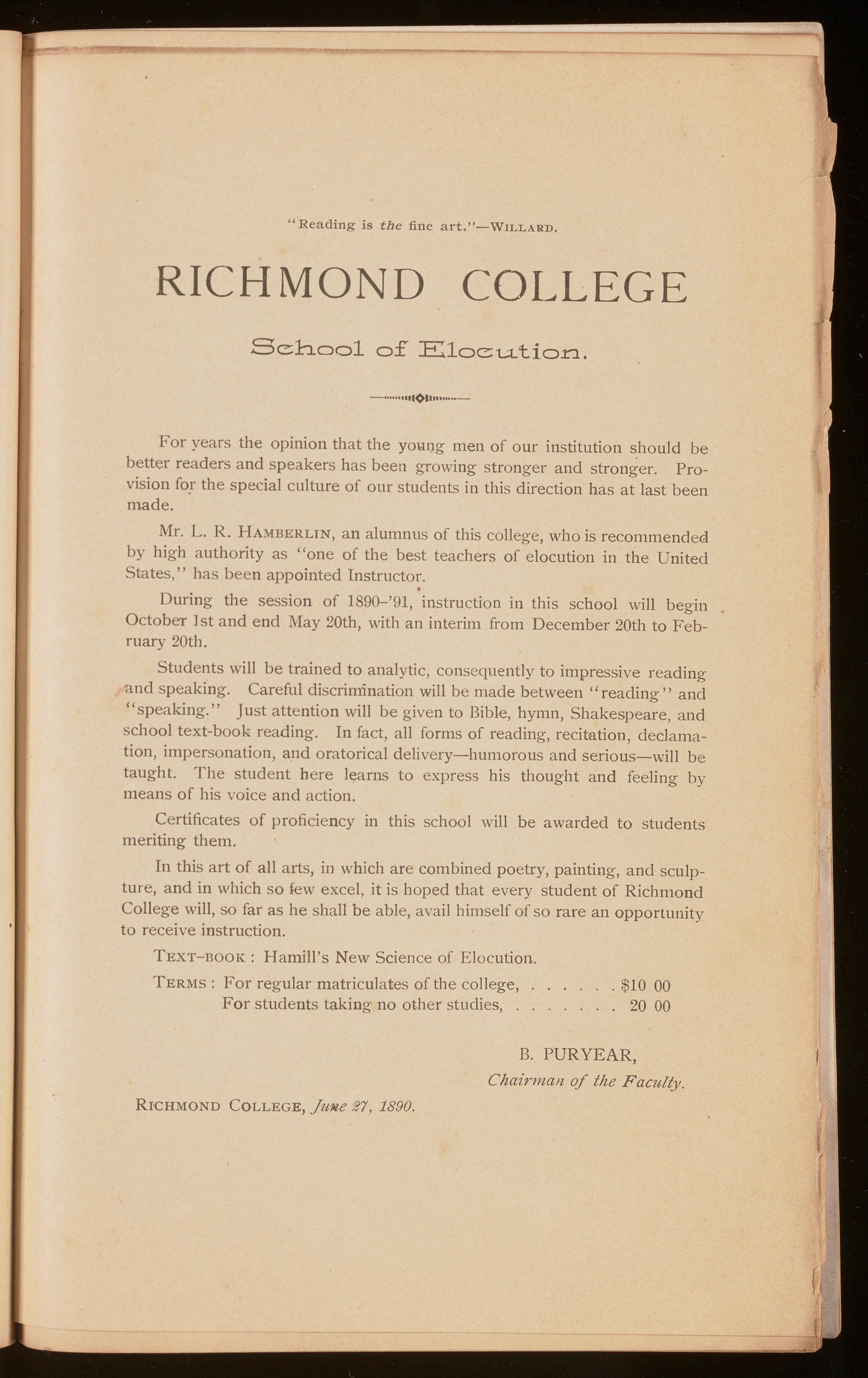
RICHMOND COLLEGE,.fu1te 27, 1890.
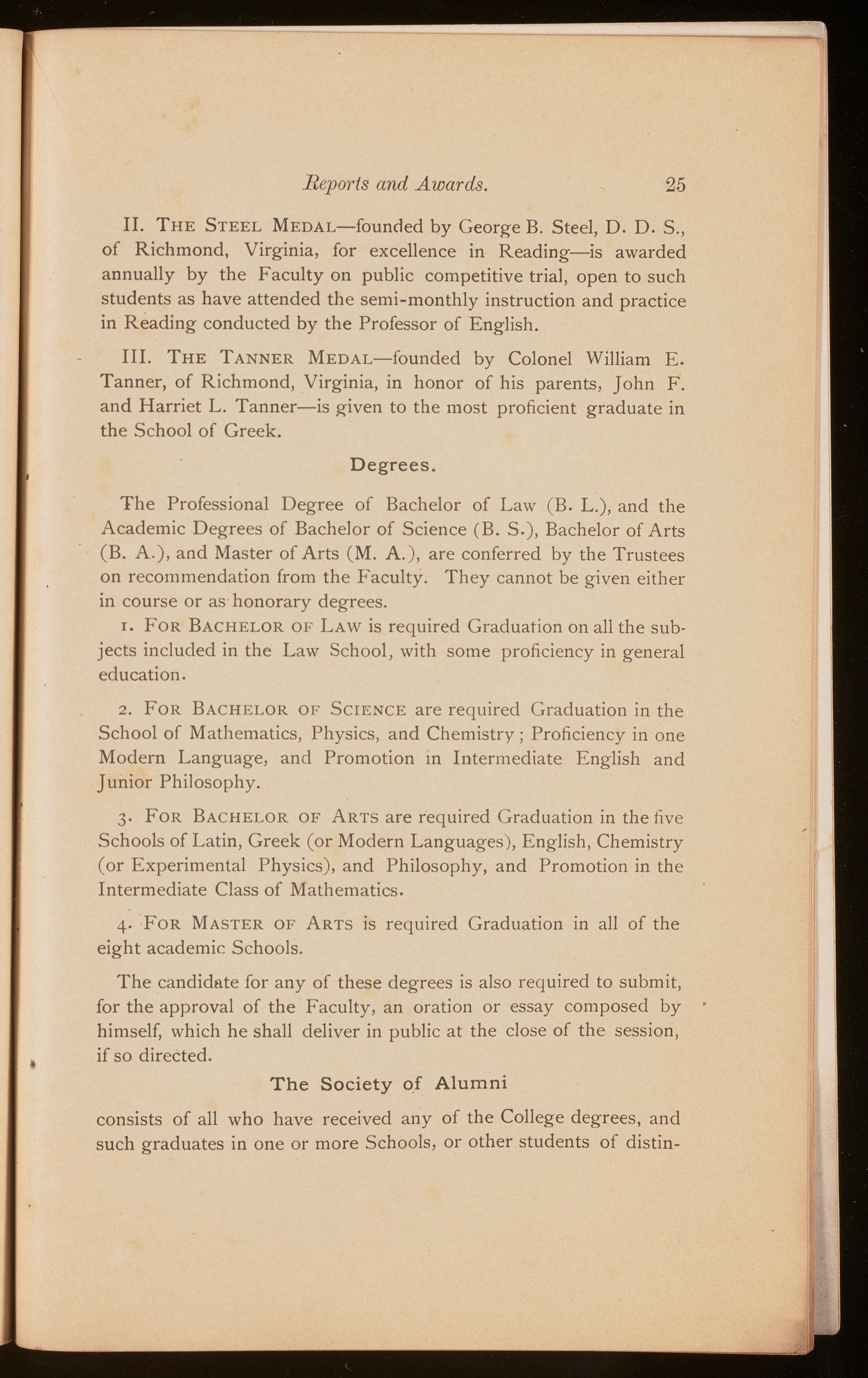
II. THE STEEL MEDAL-founded by George B. Steel, D. D. S., of Richmond, Virginia, for excellence in Reading-is awarded annually by the Faculty on public competitive trial, open to such students as have attended the semi-monthly instruction and practice in Reading conducted by the Professor of English.
III. THE TANNER MEDAL-founded by Colonel William E. Tanner, of Richmond, Virginia, in honor of his parents, John F. and Harriet L. Tanner-is given to the most proficient graduate in the School of Greek.
The Professional Degree of Bachelor of Law ( B. L.), and the Academic Degrees of Bachelor of Science (B. S. ), Bachelor of Arts (B. A.), and Master of Arts (M. A. ) , are conferred by the Trustees on recommendation from the Faculty. They cannot be given either in course or as honorary degrees.
1. FoR BACHELOR OF LAW is required Graduation on all the subjects included in the Law School, with some proficiency in general education.
2. FoR BACHELOR OF ScrnNCE are required Graduation in the School of Mathematics, Physics, and Chemistry; Proficiency in one Modern Language, and Promotion m Intermediate English and Junior Philosophy.
3. FoR BACHELOR OF ARTS are required Graduation in the five Schools of Latin, Greek (or Modern Languages), English, Chemistry (or Experimental Physics ) , and Philosophy, and Promotion in the Intermediate Class of Mathematics.
4. FoR MASTER OF ARTS is required Graduation in all of the eight academic Schools.
The candidate for any of these degrees is also required to submit, for the approval of the Faculty, an oration or essay composed by himself, which he shall deliver in public at the close of the sess10n, if so directed.
The Society of Alumni consists of all who have received any of the College degrees, and such graduates in one or more Schools, or other students of distin-
26 Richmond College.
guished merit, as may be elected to membership. They meet annually, in connection with the closing exercises of the session, to renew the associations of College life and promote the interests of their Alma Mater.
The list of officers at present is at follows: President, Rev. R. R. Acree, Petersburg, Va.; First Vice-President, E. B. Hatcher, Richmond, Va.; Second Vice-President, Conway R. Sands, Richmond, Va.; Third VicePresident, E. B. Pollard, Richmond, Va. ; Secretary, G. Harvey Clarke, Richmond, Va.; Treasurer, Richard B. Lee, Richmond, Va.
Orator for 1890, H. Allen Tupper, D. D., Louisville, Ky.
Poet, Professor L. R. Hamberlin, Shreveport, La.
Schedule of Examinations for 1891.
[Subject to any minor changes that may be found necessary.]
Intermediate.
Mon. Wed., Frid., Mon, Wed., Frid., Mon., Wed., Frid., Mon.,
Jan'y " " Feb'y " " " " " "
26-Philosophy, Junior.
28-Senior Physics ; Mathematics, II and I.
30-English-all classes.
2-Latin-all classes.
4-French, Senior and Junior.
6-Junior Physics.
9-Greek-all classes.
I I-Chemistry and German.
13-Intermediate Mathematics.
16-Philosophy, Senior and Junior. Irregular.
Senior Mathematics, about March 15th.
Senior and Intermediate Mathematics, about April 15th.
Junior Physics (first part), about April 20th.
Greek on History and Literature, about April 30th.
Senior Latin on History and Literature, about ·May 5th.
Senior Physics (first part), about May 10th.
Final.
Frid., Tues., Frid.,
May " "
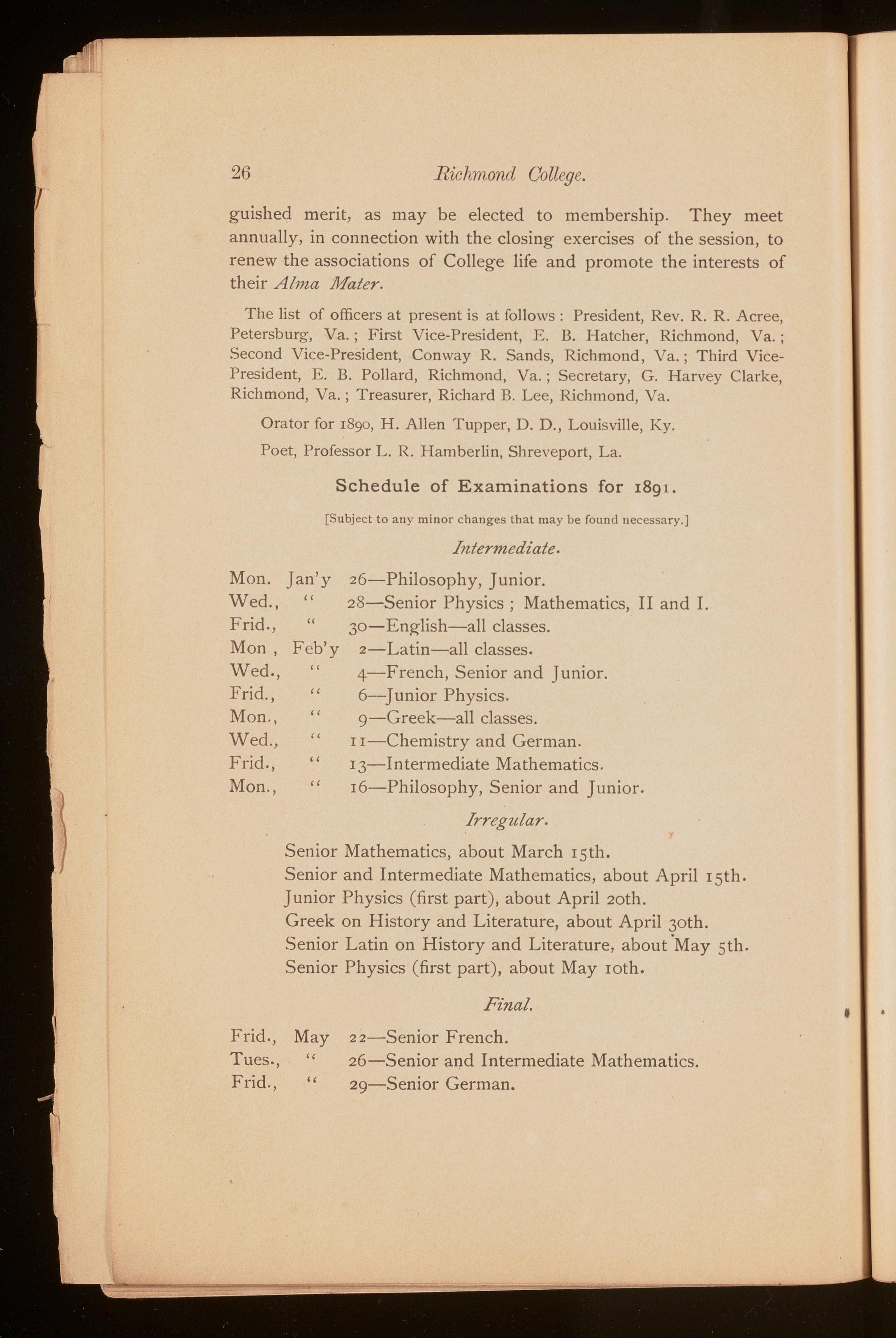
22-Senior French.
26-Senior and Intermediate Mathematics.
29-Senior German.
Mon., June I-Senior and Intermediate Greek.
Wed., " 3-Mathematics, Junior II (first half).
Frid., ,, 5-Senior and Intermediate Latin.
Mon., ,, 8-Senior and Intermediate English.
Tues., " 9-Junior French and Senior Philosophy.
Wed., " 10---Senior Physics: Greek, Junior II and I.
Frid., " 12-Mathematics, Junior II and I (first half).
Mon., " 15-Senior Philosophy.
Tues., " · 16-J unior English.
Wed., " 17-Chemistry, Junior German.
Frid., " 19-Latin, Junior II and I.
Mon., " 22-Junior Physics; and Mathematics, Junior I.

The session opens on the Thursday nearest to the 22d of September, and continues thirty-nine weeks-that is, to the corresponding Thursday in June. The next, therefore, will open September 25th, 1890. The exercises are suspended three days at Christmas. Students are earnestly advised to enter promptly at the opening, when all classes are organized and begin regular work. Any who come later will be received, provided they are prepared to join the classes already formed.
The system of independent schools allows the selection for every student of such studies as will be most valuable in qualifying- him for his future pursuits ; but while allowing such selection, the Faculty hold that the man is more than the occupation, and will always encourage a regular and complete course. To this end they reserve the right to prescribe the studies of any who may be found unprepared for classes higher than the Junior in Latin, English, and Mathematics.
Every one is required to attend at least three schools, and to adhere throughout the session to the studies selected on his matricu-
28
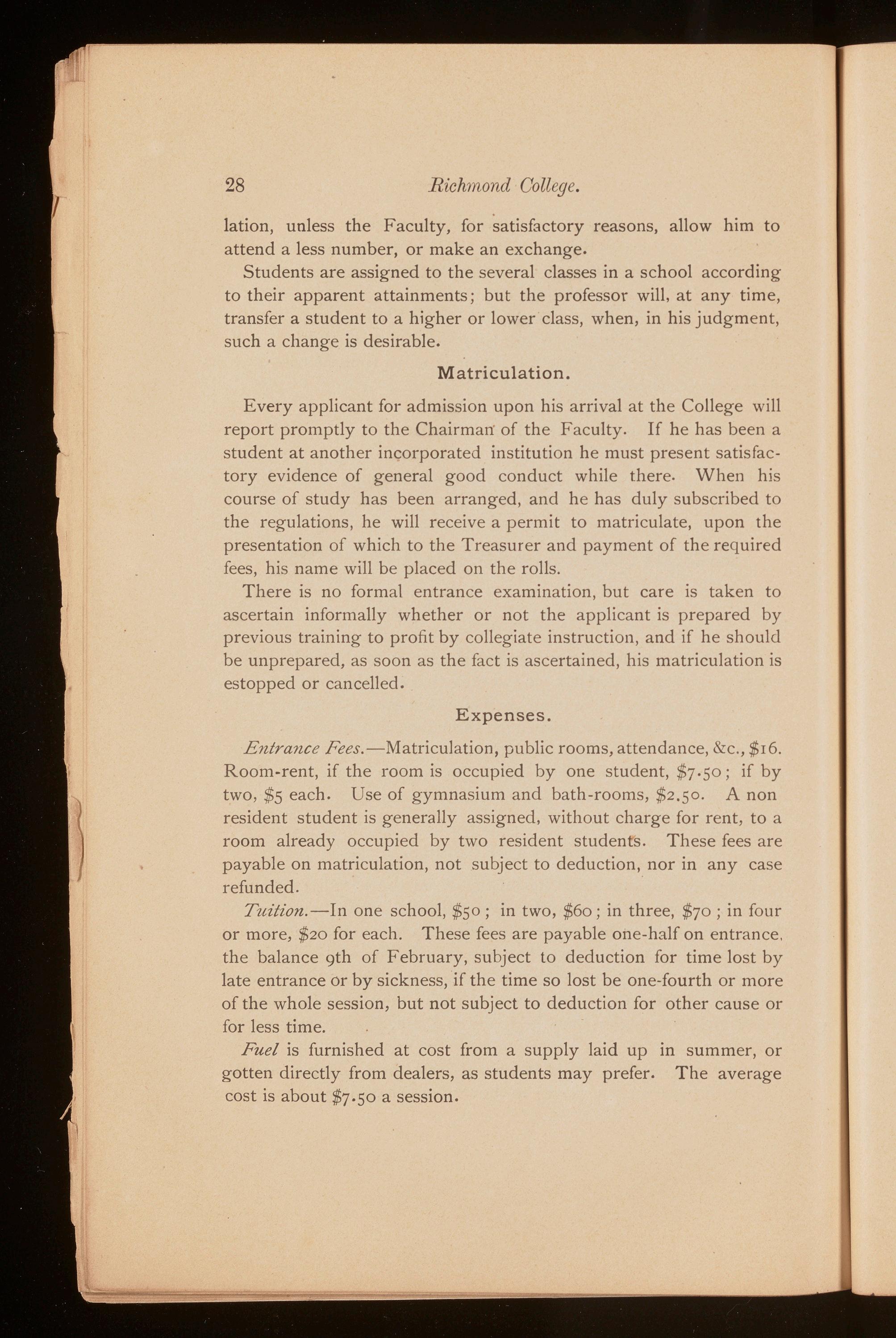
Richmond College.
lation, unless the Faculty, for ~atisfactory reasons, allow him to attend a less number, or make an exchange.
Students are assigned to the several classes in a school according to their apparent attainments; but the professor will, at any time, transfer a student to a higher or lower class, when, in his judgment, such a change is desirable.
Every applicant for admission upon his arrival at the College will report promptly to the Chairman of the Faculty. If he has been a student at another incorporated institution he must present satisfactory evidence of general good conduct while there. When his course of study has been arranged, and he has duly subscribed to the regulations, he will receive a permit to matriculate, upon the presentation of which to the Treasurer and payment of the required fees, his name will be placed on the rolls.
There is no formal entrance examination, but care is taken to ascertain informally whether or not the applicant is prepared by previous training to profit by collegiate instruction, and if he should be unprepared, as soon as the fact is ascertained, his matriculation is estopped or cancelled.
Entranc e Fees.-Matriculation, public rooms, attendance, &c ., $16. Room-rent, if the room is occupied by one student, $ 7 .50; if by two, $5 each. Use of gymnasium and bath-rooms, $2.50. A non resident student is generally assigned, without charge for rent, to a room already occupied by two resident students . These fees are payable on matriculation, not subject to deduction, nor in any case refunded.
Tuition.-In one school, $50; in two, $60 ; in three, $70; in four or more, $20 for each These fees are payable one-half on entrance. the balance 9th of February, subject to deduction for time lost by late entrance or by sickness, if the time so lost be one-fourth or more of the whole session, but not subject to deduction for other cause or for less time.
Fuel is furnished at cost from a supply laid up in summer, or gotten directly from dealers, as students may prefer. The average cost is about $7.50 a session.

Lights and Washing cost from $1.25 to $r.50 a month.
Board.-Excellent board is furnished at the Mess Hall at a cost of $9. 50 per month; in private families, near the College, from $ro to $15 a month.
_ The messing club controls its own bill of fare and shares the expenses equally, requiring a deposit monthly in advance. The plan was introduced in 1866, and has been in successful operation ever smce.
Near the College are three or four boarding-houses which furnish good tables at from $ro to $12 a month, and still others in which students can get also furnished rooms, with fuel and light, for about $15 a month.
SUMMARY-FOR A NON-RESIDENT STUDENT.
Entrance fees, except room-rent . $r8 50 Tuition in any three schools . . . . . . 70 oo $88 so
Of this amount $53.50 is payable on entrance; $35 February 9th.
SU;\IMARV-FOR A RESIDENT STUDENT.
Entrance fees . . . . Tuition in any three schools . . . . . Board, fuel, lights, washing, &c., about. . $ 23 50 70 00 . 114 00 --s 207 50
Of this amount about $85 will be needed on entrance; $35 February 9th, and the rest at intervals during the session.
Diploma Fees.-For every Certificate of Proficiency or School Diploma awarded the charge is $r. For a Degree Diploma, $5.
Refundable De_posits.-Resident students are required to deposit with the Treasurer $5, and non-residents $2. 50, to cover any damage to College property or Library fines. At the close of the session this money, or such portion as the depositor may be entitled to, is returned.
Non-resident students, if assigned to a room for study during the day, will pay $2.50 on account of fuel. This is collected by the Treasurer and paid over to the occupants of the room.
All students are earnestly requested not to keep money about their persons or in their rooms, but to deposit it for safe-keeping with the Treasurer, subject to demand at any time.
Furniture.-The occupants of each dormitory supply the necessary furniture. If the bedding, towels, &c., be brought from home,
30 Richmond College.
the outlay for furniture need not exceed $6 apiece, and the articles bought here can readily be sold again when the student leaves College.
Ministers of the Gospel, of all denominations, and young men duly approved by their churches as candidates for the ministry, are admitted free of charge for tuition or room rent. They pay an en• trance fee of $13.50, and for fuel, lights, board, &c., the same with other students.
The Education Board of the Virginia Baptist General Association will render further assistance to worthy young men recommended by churches which contribute to the Board, and accepted after examination. For information on this matter, address Hon. J. T. Ellyson, Richmond, Va.
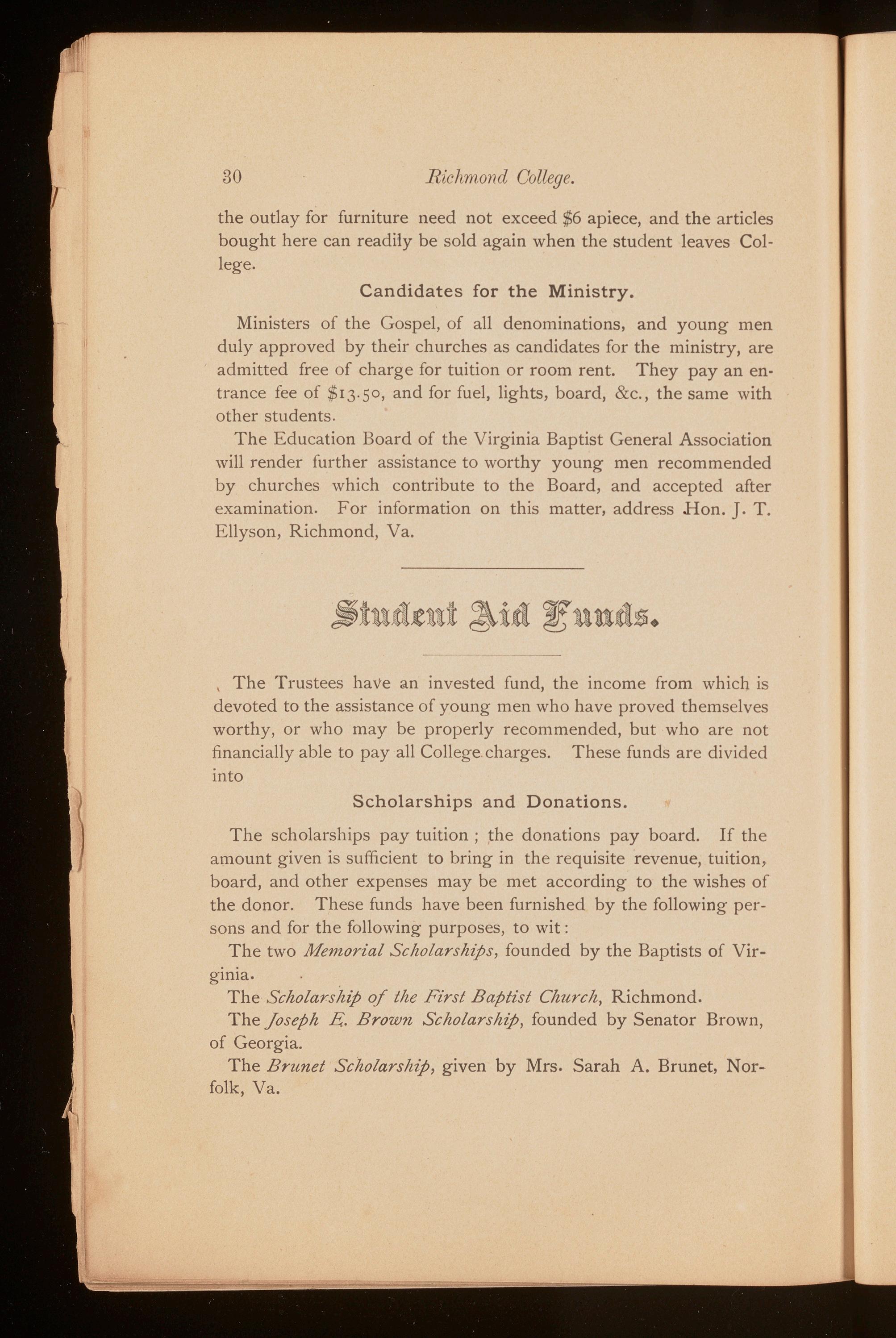
, The Trustees have an invested fund, the income from which is devoted to the assistance of young men who have proved themselves worthy, or who may be properly recommended, but who are not financially able to pay all College charges. These funds are divided into
Scholarships and Donations.
The scholarships pay tuition ; the donations pay board. If the amount given is sufficient to bring in the requisite revenue, tuition, board, and other expenses may be met according to the wishes of the donor. These funds have been furnished by the following persons and for the following purposes, to wit :
The two Memorial Scholarships, founded by the Baptists of Virginia.
The Scholarship of the First Baptist Church, Richmond.
The Joseph E. Brown Scholarship, founded by Senator Brown, of Georgia.
The Brunet Scholarship, given by Mrs. Sarah A. Brunet, Norfolk, Va.

Student Aid Funds. 31
The Davidson Scholars/tip, founded by Mrs. S. E. Davidson, Rockbridge county, Va.
The two West Scholars/tips, by George B. West, Newport News, Va.
The Schmelz Haif Scholarship, founded by H. L. and Geo. A. Schmelz, Hampton, Va.
The Fannie Lea Haif Scholarship, by Mr. and Mrs. Lea, North Carolina.
The A. M. Poindexter I-Iaif Sclwlarship, founded by the Dan River Baptist Association.
The Elizabeth Stetson Aid Fund, $5,000, given by John B. Stetson, Philadelphia, in honor of his wife.
The Ella Williams Students' Aid Fund, $5,000, given by the late Thomas C. Williams, of Richmond, in memory of his daughter.
The William Hawl.::ins' Fund, $3,000, founded by the gentleman whose name it bears, to aid in educating godly, studious, deserving young men.
The Donations, used mainly to help young men studying for the Gospel ministry of the Baptist denomination, to be paid on their board or for general expenses :
The Woolverton Donation, $r,ooo, founded by George A. Woolv~rton, of Albany, N. Y.
The John Tabb Donation, $1,200, founded by Thomas Tabb, Hampton, Va., in memory of his father.
The Mathew T. Yates Donation, $1,000, given by Rev. Dr. M. T. Yates, missionary, Shanghai, China, "to help educate young men who shall continue to preach after my voice is hushed."
The Joseph B. Hoyt Fund, $5,000, given by the deceased friend whose name it bears, of Stamford, Conn.
There are other funds, both for Scholarships and Donations, which will be available next session not entered here because they have not been reported to the Board of Trustees. This will be done at the annual meeting in June. Additional gifts to the Students' Aid Fund are earnestly invited.
Regulations.
The committee in charge have general instructions, in making their award of all Aid Funds, to give the preference:
First. To applicants already at College who have maintained a good standing both i~ character and in study.
Secondly. To other applicants who shall present satisfactory testimonials from the school last attended, or from other persons who have had opportunity to judge, certifying to their health, attainments, habits of study, and moral character.
Tlzirdly. To those of either class who give reasonable assurance that they will complete a course of study leading to one of the Degrees of the College.
The recipients of aid are expected to prove, as students, not only above censure in all respects, but actively helpful to the College by example and by earnest work.
The awards will be, at all times, subject to revision by the Trustees, who reserve the right to withdraw the privilege on account of neglect of duty, serious misconduct, or failure to maintain an average standing- of at least seventy-fiv e per cent. in three schools.
These Aid Funds are awarded annually by a committee of the Trustees, which meets on the first day of July, and of which Rev. C. H. Ryland, D. D., is secretary.

Th e need of ample endowment is every year more apparent. The College has passed the line of venture ; and, by reason of its admirable location, thorough safety, and conservative management, is in condition to give the amplest security for the prompt and effective use of all gifts. No institution affords a better field for investment by those who wish to promote high, Christian education.
A conspicuous feature of the endowment is the '' Bostwick Fund,'' so named from the liberality of Mr. J. A. Bostwick, of New York, who, within recent years, has given the College bonds and stocks whose face value is '$51,200, and whose liberal income has proved a great relief to the necessities of the College. Mr. Bostwick leads the benefactors of the College by his unexampled kindness and

The Endowment. 33 generosity. He has endeared himself to our people, and linked his name imperishably with Christian education in Virginia and the South.
Largely through his influence, and stimulated by increasing demands for enlarged equipment in every department of the College, the Trustees have adopted a wide-reaching scheme of endowment. This embraces additions to the general endowment, used for the pay of Professors, the endowment of Schools, enlargement of Aid Funds, and the better equipment of the Library and Museum, the particulars of which will be given in another form. The need for this work is urgent, and the friends of the College are confidently appealed to for active help and generous giving in order to insure success.
The Financial Secretary, Rev. C. H. Ryland, has charge of all matters pertaining to the collection, preservation, and increase of the funds of the College. All communications on this subject should be addressed to him, and will be treated as confidential when desired.
"I give and devise to Richmond College, located at Richmond, Virginia, the following real estate, to-wit : (!iere describe the said r eal estate, as to kind, quantity, attd situation.)
"I also give and bequeath to the said College the sum of. . . . . . . . dollars ($ . . . ), and the following bonds (or stock ) , to-wit: (lzere describe the bonds or stock ) all of which are to be used for the following purposes , to-wit : (here describe th e purpos e for w hich it shall be applied)."
MONDAY.

TUESDAY
Senior Maths.
Jr. Fr'ch IJr. Ger
Int. ::\fathematics. Sen. Physics.
Sen, Fr'h. ISr. Ger
Jun. Philosophy.
ll!athemalics TI.
Sen. Fr'h. \ Sen Ger. Jun, Philosophy. Jun. Physics.
Sen. Philo;ophy. :\fathematics I.
Jr. Fr.ch. IJr. Ger._ Mathematics II. Jun. Physics. Sen. Philosophy. Mathematics I.
Int. lllathematics.
WEDNESDAY. I Sen. Physics.
Jr. Fr'ch, / Jr Ger.
Int. l\lathematics.
THURSDAY.
Sen. Physics.
Jr. Fr'ch, 1Jr. Ger.
Sen Fr'h ISen. Ger. Sr. Maths. Jun. Physics.
Seu. Philosophy. :\lathematics I.
Sen , Fr'h. ISen Ger. Jun. Physics. Juu, Philosophy.
l\!athemalics 11.
Seu Philosophy. l\1athematics I.
Chemistry. I Sen. Latin. Sen Greek ,
Greek II. Latin I. Chemistry.
Greek II. Latin[. Chemistry.
Greek II. Lalin I. Chemistry.
Int. English.
Greek I.
Sen. Lalin. Int. English.
Greek I.
Int. Latin. Jun. English.
Sen. Latin. Sen. Greek. Int Latin. Jun English. Sen. Greek.
Int. English, Int. Latin.
Greek I. Jun. English.
Sen. Latin.
2.20 3.10
j Sen. English.
Int. Greek.
Latin II.
Sen. English. Int. Greek.
Latin II. Sen. English.
Int. Greek.
FRIDAY
fnt. l\'lathcmatics. Sen. Physics.
~r'ch. IJr Ger.
Sen. Fr'h. ISen . Ger. Jun. Philosophy. Mathematics II. I
Sr. Maths. Jun. Physics.
Greek II. Lalin I. Chemistry. Greek TI. Latin I.
Int. English. Greek I. Sen. Latin. Sen Greek. Int, Latin. Jun. English. Sen . Greek, I Int. English. Int. Latin.
Lalin II. Sen. English.
Int. Greek. Latin II. Sen. English. Int. Greek.
Greek I. Jun. English
The Professor of Chemistry will question hi s class l'wo hours a week, at such times as he may appoint. ·1he foregoing is the scheclnle of the session 1H80-'00, and will he followed session 1800- '01, so far as may be possible.
Latin II.
